#who views law as an ideal instead of a tool
Text
Hey now that Good Luck Jake! is completed I can share the fucking Matt Murdock backstory that I mentioned really really want to establish. I mentioned some joke headcanons/elements of the AU (there are very little differences.) here but I can go into detail without spoiling now.
The Marvel Universe is weird and insane things constantly happen and there's entire magic civilizations. Although the superhero thing and the insane quantity of apocalypses is mostly new, a lot of stuff that is bonkers to us is probably normal to them even before superhero stuff starts happening.
Therefore, I think there's a ninja industrial complex.
Matt is a victim of this ninja industrial complex.
Recruited as part of an urban outreach program serving/exploiting underprivileged youth (turning them into ninjas), he was recruited by Stick and joined ninja ROTC. Although he was a real whiz kid in the business and showed a lot of potential for career mobility, Matt wanted to escape this ninja-to-cultist pipeline.
Matt believes in choices! As a young kid he was railroaded into academics and as a teenager he's railroaded into the ninja thing. Everybody who raised him instilled in him a very strong passion for justice, righteousness, and ethics, but as he gets older he begins to believe that there's a better way than vanquishing rival ninja clans. He's insanely morally aggressive because he was raised highly moralistically with an intense sense of right and wrong, but he believes that God showed him his own path into crusading for right and wrong. Since he was fifteen, his life dream was to become an ordinary person. A law abiding member of society. Someone who does the right thing without murder and fights for the weak instead of against the strong.
A lawyer.
Matt really really wants to be Just A Dude. He begs Stick to let him go to law school ("Ninjahood isn't my dream, Dad, it's yours!"). He is aggressively normal. He insists that he is normal. Yes he's a ninja but he's just some guy and ninjas have exploitive business practices anyway. Ignore all the batshit stuff I do I am a normal member of your study group. He is a man without fear because he has no idea what is normal in society or not.
The ninja thing is common knowledge, so Matt does more 'hide his extra-sensory superpowers' than 'pretend to be ordinarily and 100% blind'. This isn't weird because there are a lot of blind kung fu masters. Matt insists that blind kung fu masters are a dime a dozen. Foggy thinks that Matt is objectively the coolest person alive but that they don't teach you social skills at ninja school.
Of course, this never raises any suspicions about him being Daredevil. Daredevil is, obviously, a boxer.
If you were to ask him about any of this he'd just go 'can't help being a Libra' and backflip away.
#my writing#matt murdock#daredevil#yes i do just think all of this is funny but#I do think it's interesting to trace back Matt's insane moralism as the one similarity between two highly divergent upbringings#and he believes in what they both taught him in different ways#but thru God he's like wait I need to find my own path & what i believe in#and while he obviously psychologically needs to punch people#i think at the end of the day he believes that he does the most good through the legal system#because it's so so so much harder than just punching people#and flipping matt's script as a member of society whose been fucked up#into a fucked up guy who strives to be a member of society yet reliably finds himself falling short#who views law as an ideal instead of a tool#is nifty i think!#if i were to write a matt story id go more into that psychology for tumblr posts i really just need to express the ninja ROTC thing#also lowkey instead of guy whose practically sighted but pretends to be blind#i kinda prefer guy who has his own lvl of blindness and coping mechanisms who exists as himself#himself who is always a blind person no matter what other parts of him there are#with matt murdock typical lvls of keeping a lot of personal details buttoned up#hurts the essential matt traits of intense levels of repression and lying but you could hit those notes in other ways
72 notes
·
View notes
Note
There's this weird thing going on Reddit right now where people are claiming that legally, Rhaenyra children are not bastards. And I was wondering if you agree or disagree. I think that people are just making up their own canon lore at this point.
Hi anon,
I think what gets kind of muddled in this discussion is what "legally" means in the context. Generally speaking, children born within wedlock are considered legitimate until proven otherwise. Now in the medieval world, it's not like you were issued a birth certificate that you could whip out and say see, it says right here who the father is! There were no DNA tests, it was all a matter of word, and by and large a woman's virtue was her word, and it was what kept her and her children protected within the framework of medieval marriage. But the reason why bastardy matters in this context is also important. It's not like Rhaenyra is trying to collect child support here, nor is she a common merchant's wife whose husband has decided just to roll with it. She's the heir to the throne and the parentage of her children is a matter of inheritance and dynastic succession, so it's not a situation where a legal loophole is particularly helpful as a gotcha. There is not at this point in history a comprehensive codified law that clearly defines what these terms mean and defines the rights and obligations of parents and children legitimate and illegitimate, mostly you have combinations of precedent, tradition, oath, and a healthy dose of might makes right.
(I saw another reply to this question in which the responded basically goes, "free yourself from the shackles of this construct! Marriage isn't real it's an oppressive institution and the idea of bastardy is made up, so let it go," and while it's true that marriage, legitimacy, etc. are all social constructs and not absolute states of being, they started off as having a functional purpose within a certain social framework. And this is a basic problem a lot of people have with George's world, it's not that we have to have the views of a 12th century French peasant, or that everything has to be historically accurate, but George chose the medieval world as a setting for a reason, and it's not just an aesthetic one. Characters in even a quasi-historical setting have to act within the constraints of that setting. We have to understand that people don't know what they don't know. The medieval world doesn't have any framework for the introduction of feminist ideals. Westeros hasn't even had a Christine de Pizan yet. You couldn't walk up to a medieval peasant woman and say "marriage is a tool of patriarchal oppression and bastardy is a social construct," they'd look at you like you had two heads. And so we have to acknowledge that you can't simply start dismantling existing social structures if the framework doesn't exist to replace them with something better that offers more protections for a broader group of people, and at this point it definitely doesn't. Making an exception for one very privileged woman does not mean progress for all women, instead it often means destabilization of the flawed system that does exist, and even more violence against those less powerful in order to enforce the exceptional status).
So from a medieval point of view, marriage was pretty much a non-negotiable for a woman. And women weren't simply getting married because they were pressured into it by their families or because their fathers were opportunistic assholes, they got married because unmarried women had no legal status or standing. In most places they could not sign contracts or own land. A woman could join the church or get married (or become a prostitute, but it's not like sex workers had freedoms or protections either). Divorce wasn't a thing, and annulment was hard to get and usually available only as a tool for men to set aside their wives. So, for all intents and purposes, once you were married, that was generally it, you were stuck for life (the upside is that widows did get a lot more freedom, so marrying an older guy and waiting it out was not a bad option sometimes, all things considered). But what marriage did provide was assurance that you and your children would be protected and provided for. Marriage was a practical agreement, involving dowries, inheritances, and alliances sealed in blood. And this is one of the reasons why bastards could not inherit. Inheritance for once's children was one of the few perks of a marriage for a woman (this is, incidentally, why Alicent is so pressed about her children being effectively disinherited. There is NO reason for her, as an eligible maiden of good standing, to marry a man who will not provide for her sons, king or not). And of course, a man's bastards are obvious and are disqualified from inheriting (setting aside legitimization because it is not nearly the easy out that people think it is). You can't really pass them off as legitimate because your wife clearly knows which children she gave birth to, whereas a man might be told he is the father of a child when that child's father is in fact someone else.
In a dynastic marriage, all of this becomes even more important. Marriages were made as alliances and to strengthen the ties between kingdoms or houses. A child seals the marriage agreement by binding two bloodlines and creating kinship bonds that will last beyond the current generation. Those kinship bonds can ensure peace between kingdoms at war, trade agreements, and military aid. Passing a bastard off as trueborn breaks that agreement; it violates the very principle by which the agreement was made. And in this context, it doesn't actually matter if the father claims the children as his, because in a dynastic marriage inheritance is not just a personal matter, it's a matter of the state. The truth matters to a great many people, more than just the immediate family. A lie doesn't become the truth simply because the liar isn't caught, and there's no statute of limitations or court ruling that will ever put the matter to rest for good. Passing off a bastard as trueborn destabilizes the succession and breaks the dynastic bonds that the marriage was meant to establish. When the bastard heir in question attempts to take the throne, it won't be a smooth transition.
So what does it mean that Laenor and Corlys agree to pass Rhaenyra's children off as trueborn? It means that their bastardy cannot be proven at the moment insofar as the legal father, Rhaenyra's husband, is playing along and covering for Rhaenyra, and Viserys is backing them up by giving this his "legal" stamp of approval. But again, our view that it's no one else's business but Laenor and Rhaenyra's and that Viserys "legalized" their status is very modern. Jaehaeyrs and Alysanne were not considered married in the eyes of the Westerosi until they'd had a bedding ceremony, that is, the consummation of their marriage was witnessed. Royal marriages and the children that come from them are a public matter because the succession affects everyone in the realm. Laenor, Corlys, and Viserys can protect those children in the short term, but Laenor and Corlys and Viserys won't live forever, and they could withdraw their support for those children and renounce them as bastards at any time. Harwin could admit to fathering them, Rhaenyra and Harwin could get caught in the act, or someone else close to them might confess. Sure right now the black faction are all one big happy family, but 20 years down the line when bastard Jace takes the throne over trueborn Aegon III? There are multiple people in the family who could confess to knowledge of the bastardy, including Aegon III himself. The bastardy is too obvious and there are too many legitimate heirs of both house Targaryen and house Velaryon getting pushed aside in favor of bastard born children for it to be an issue that simply disappears because Rhaenyra and Laenor say so.
So "legal bastardy" is a pretty meaningless concept when it comes to royal succession because it's not a matter that's going to be settled by some neutral third party in a court of law. What matters in the long run is not whether or not Laenor claimed the kids, what matters is whether or not the situation is questionable enough that people with the power to challenge it might challenge it. And we see even within the actual narrative of the Dance that this is indeed the case. There is already a situation brewing with the other branches of the Velaryon family who are rightfully pretty pissed to see their ancestral seat pass to someone with no blood ties to the family (and as an aside, people will say Vaemond was self-serving, and of course he was, but that doesn't make him wrong, and maybe Baela or Rhaena should have inherited instead, but neither they nor their father were pressing their claims because they were backing up the bastard claimants, so was Vaemond supposed to do that for them?). And yes the king and Rhaenyra can cry treason and they can kill Vaemond and cut out tongues, but using force to silence people for telling the objective truth is by definition tyranny, and that's exactly the sort of situation that would get the nobility nervous. Because if Rhaenyra has to silence people already and she's not even queen yet, what will Jace have to do when he takes the throne? That's the real problem, not the "legal" status of Jace and his brothers, but the practical ramifications of hiding the truth.
122 notes
·
View notes
Text
Demigod Dossier: Oni Daimyo, part 1
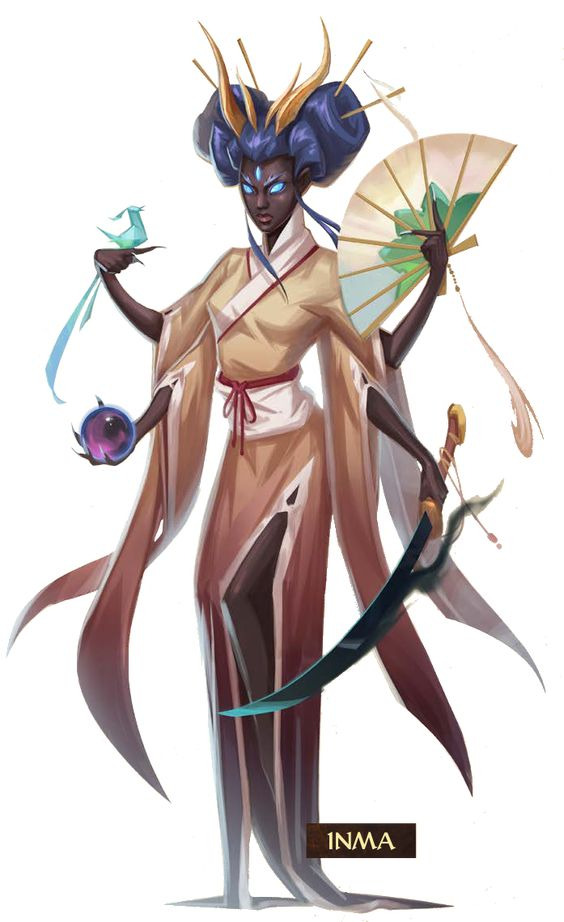
(Pictured: Inma, Empress of the World, the greatest of the Daimyo)
Lawful, Neutral, and Chaotic Evil Incarnations of Debauchery and Depravity
The Complete Book of the Damned, pg. 126~127
The Oni are an interesting bunch, to me. Each Oni begins its existence as a Kami, a spirit of the land directly created by the gods to preserve the world, as well as the relationship between nature and those with the power to change it (i.e. mankind). Any kami that fails to uphold the Laws of Golden Perfection, an esoteric series of laws no mortal being could hope to understand, becomes an outcast and is relieved of their duties once their replacement is crafted. Many kami simply fade into nonexistence, while some devolve into mindless nature spirits... but the majority of these disgraced stewards instead evolve into Oni, malicious spirit creatures that can form a physical body once they enter an area of mass death and tragedy.
Upon incarnating, all oni get to experience sensations for the first time. According to oni, their pathetic kami forms don’t feel, see, smell, or taste like their new flesh body does; everything is so much brighter, louder, tastier, more impactful once they have a physical form. So, naturally, oni completely devolve into pleasure-seeking hedonists hellbent on maximizing their exposure to every form of sensation they can get ahold of with the power they possess. Like the Rakshasa that some of them share an alignment with, the oni are intentionally a ‘less severe’ class of fiend a DM can sprinkle into their sessions with lower stakes; oni aren’t conquering worlds or destroying countries. Each one seeks their own satisfaction above anything else, so their villainous actions can be... varied. One may kidnap musicians because they wish to hear a song they wrote played by a professional, one may steal maidens of a specific holy order because their blood tastes the best, and one may level a city block because the buildings were blocking the sunlight shining through their favorite stained glass window. Destructive and scary, but not world-shaking.
The Oni Daimyo we’ll be looking at today are the end result of a very specific process that oni can go through: Oni view mortals as taking the wonders of the world for granted and enjoy punishing those who don’t go out of their way to enjoy what they can have and destroy what they cannot (i.e. anyone who isn’t an evil hedonist). They believe that the greatest pleasures only become so when they’re taken from another... and thus a Daimyo emerges from the horde when it realizes that “another” includes other oni. Browbeating their lesser kin into obedience, all Oni Daimyo acquire the power of a demigod by brute force, tyrannizing lesser oni into providing the ascending fiend with excess and experience until it ignites a divine spark within them. The three we’ll be looking at today are the ones that caught my eye among their small number...
Oni Daimyo work freely and happily with mortals, seeing them as toys, tools, or perhaps even partners and consorts. Whatever role they serve in a Daimyo’s court, those who devote themselves fully to the Daimyo’s ideals can access a cache of divine magic they can exploit. Worshipers receive Boons that are are relatively simple: a trio of spell-like abilities, each of which may be used 2/day. Boons are normally gained slowly, at levels 12, 16, and 20, however entering the Evangelist, Exalted, or Sentinel Prestige Classes can see the Boons gained as early as levels 10, 13, and 16.
Oni Daimyo come across the entire spectrum of Evil alignments, but they’re not demons, devils, or daemons, and thus the Demoniac, Diabolist, and Souldrinker classes are barred to them without DM fiat.
Inma, the Empress of the World
Lawful Evil Daimyo of Lavish Wealth, Origami, and Servitude
Domains: Community, Evil, Law, Nobility
Subdomains: Family, Home, Leadership, Tyranny
Obedience: Craft delicate origami representing those you seek to rule over.
Benefit: Gain a +4 profane bonus on saving throws against mind-affecting effects.
Aw, how nice :) Inma is the most powerful of the Daimyo, so it’s ironic to me that she has one of the most peaceful Obedience rituals. Quite a few of the Daimyo, in fact, have rituals that can easily be hidden or passed off as a form of meditation, making it easy to hide your faith in the hedonistic fiends even under close observation. Who in their right mind is going to wonder if you’re evil for folding paper? I do appreciate that Inma doesn’t make you dramatically crush or burn or otherwise dispose of the folded figures, because it means you can unfold the origami and re-use the same sheets for your next Obedience. It’s a small thing, but I like when recycling your ritual materials is an option.
Unlike many Obedience rituals that can be quashed by being robbed or imprisoned, you can perform origami with just about any flat, flexible material of the appropriate size. In a pinch, you can tear cloth into strips and fold them as well. Again, it’s small, but I appreciate the flexibility and ritual resilience.
And the benefit? Incredible. Blanket +4 to saves against the biggest class of Save-or-Suck spells and effects in existence, making you that much harder to charm, Dominate, mislead, distress, and emotionally manipulate. A +4 to saves against ALL mind-affecting effects rather than a subset like compulsions is incredibly rare and should be appreciated for how many times it’ll probably save your life (and your party’s life) over the course of your adventuring career!
Boon 1: Create Treasure Map
Boon 2: Charm Monster
Boon 3: Extended Dominate Person
Create Treasure Map is a somewhat niche spell, but one I’m happy to have as a spell-like (especially since it ignores the 100gp component cost) rather than needing to use a precious spell slot or waste spells known to have available. It’s a little gruesome, requiring a portion of a slain creature to use--typically a stretch of skin or piece of its hide--but it creates a map between where you’re standing and up to 3 (+1 per 3 levels) caches of whatever that creature considers valuable, along with whatever features and dangers the creature remembers being on the way there. Don’t bother using this on animals and unintelligent beasts as all you’ll get is food stores or perhaps its nest (which, hey, if that’s your objective...), but on various bandits and baddies, you’ll be pointed right to their treasure caches (alongside whatever else they saw as worth remembering). The map even works on any scale, so whether the target’s treasure is 30 feet or 300 miles away, you’ll get your quest objective... just know that the wider a net you cast, the less reliable the map becomes. It notes hazards the creature remembers, but some may be too small to actually show up if the map covers enough territory.
The next two can be lumped together fairly easily, as both are excellent tools at 1/day, let alone the 2/day that your Daimyo grants! Charm Monster is an off-switch for a potentially painful encounter, making a temporary friend out of any monster you may meet on your journeys, which has as many applications as you can possibly imagine. With a duration of a day per level, you can more or less keep a creature (or even several creatures) permanently on your side, perhaps even long enough to convert them into a friend WITHOUT magic, as morally questionable as such a thing may be (but you are Evil, so...). Dominate Person isn’t as flexible when handling encounters as Charm Monster, as it only works on Humanoids and Monstrous Humanoids, but there’s a lot of Humanoids in the world, and two free castings of “gain an ally that will fight for you” that lasts for weeks on end and have no components so even people carefully watching you won’t know you’ve just turned their guards against them. Having the spell be Extended feels like overkill considering it also lasts for a day per level, but if you need to send your new thrall on an extended errand, it can be useful to have them in your pocket for four weeks instead of two. Between these two spells, castable twice each, you can amass an entourage in a shockingly short time... in fact, to preserve the DMs sanity, you may want to limit the Domination to just two creatures at a time!
------
Gyuku, the Sea Devil
Chaotic Evil Daimyo of Piracy, Tea, and Tsunamis
Domains: Chaos, Evil, Strength, Water
Subdomains: Entropy, Fear, Ferocity, Oceans
Obedience: Perform a tea ceremony on the shore of an ocean or while blindfolded.
Benefit: Gain a +4 profane bonus on saving throws against water-based effects.
Another cute one! Despite Gyuku being one of the most violent of the Daimyo, her daily ritual is a meditation and centering ritual. There’s something ironic about a Chaotic Evil hedonist demanding her followers calmly make tea every day, but I suppose when you’re an Oni, you get really serious about how your food is prepared. I appreciate that in contrast to other oceanic demigods, she DOESN’T lock you to the shorelines like the others do, allowing you to practice your tea ceremony blindfolded if you can’t, for whatever reason, access the sea. Regardless of the alignment of your allies, few will see anything off about you performing such a small ritual every day, allowing you to masquerade as Good, or at least hide your faith from investigators and guards...
It’s an Obedience with no listed cost, but you’re still not likely to perform it if your belongings get pilfered, but you don’t even need a particularly expensive set. Even just a cup of hot water and a single bag of tea will allow you to do something to please your Daimyo enough to get your power for the day... especially if granting you your power would let you wreak havoc on the people who stole from you in the first place.
The benefit is, in stark contrast to the first of the Daimyo, underwhelming. Water-based attacks and spells are few and far between, and most of them are more of an than an inconvenience than something you really need to worry about. In many cases, this just reads “+4 to saves versus being knocked prone,” but there’s nevertheless a decent few Adventure Paths (yes, Reign of Winter; many Cold spells also have the Water descriptor!) where this ability would come in handy... outside of those, though, this benefit is sub-par.
Boon 1: Slipstream
Boon 2: Control Water
Boon 3: Heroes’ Feast
Alright, cute. Slipstream isn’t an especially useful spell, sitting in the pile of “spells I would never prepare but find inoffensive to have for niche scenarios.” It lasts well over an hour when you first get it and goes up by 10 minutes/level from there, but all it functionally does is add +10ft to the target’s walking speed. Nothing special, but I’m sure the Heavy Armor Enjoyers in the party will appreciate being able to walk at normal human speed for a few hours a day, with the amusing option of getting an extra +10 on top of that if they so happen to be traveling downhill. The real usefulness of the spell is the +20ft to the target’s swim speed, letting them travel with decent swiftness underwater; if they don’t already have a swim speed, they gain one! Unfortunately they don’t get any ability to breathe underwater, but since even weedy little nerd Wizards can hold their breath for over a minute at a time (provided they didn’t dump Con (don’t do this)), it’s not much of an impediment if you just need to dive down and then back up. Think of it like a ‘swim underwater’ spell that has an added bonus once you’re no longer IN the water! That at least makes it less disappointing.
Unlike the next spell, which has a myriad uses. Control Water allows you to create whirlpools, stop floods, create floods, shape water pillars, and generally screw with the depth and shape of enormous patches of water for hours at a time, making you the bane of ships, which is perfect for a follower of a goddess of piracy! Whether it’s trapping victims to make them easy pickings, raising pillars behind you to block off enemies, flooding dockside towns, or slamming Water Elementals and the like with a nigh-permanent Slow, your crew will no doubt appreciate your control over water (though everyone else will likely be a little unenthused), In other scenarios I’m afraid it’s not as useful, but I’m sure there’s plenty of moments when draining enormous amounts of water from a room or causing even more water to flood out of a specific receptacle would solve a puzzle that’s otherwise halting your party. I do appreciate that Control Water also specifies it can be used “on similar liquid,” though what is similar to water and thus what can be affected by the spell is left up to the DM to decide.
Control Water offers utility to a scurvy dog and the mangy crew, but Heroes’ Feast offers to cure that scurvy and provide the most important resource a captain must be aware of: Morale and loyalty. There’s little that can keep a pirate crew happy like being allowed to eat a Heroes’ Feast every single day, once at breakfast and once again at dinner, and you’re able to whip up a meal for up to 16 people per casting when you first get this ability, which covers yourself, the ships’ officers, and some extra crewmates you’ve grown to like or who you believe deserve the honor. As one of my favorite spells I’ll sing the praises of the Feast every chance I get, and while it may be underwhelming in terms of spells that make you a better pirate, having it available twice a day will, if nothing else, assure sickness, poison, and starvation are no longer a concern on the seas, AND make you beloved by everyone who regularly partakes... and should they get too used to your food, to the point of relying on its availability and not stocking up on their own rations... well, it’d be awful unfortunate if your ‘allies’ didn’t pay for the privilege to continue feasting.
------
Nataka, the Red King
Neutral Evil Daimyo of Drought, Perfume, and Forest Fires
Domains: Destruction, Evil, Fire, Weather
Subdomains: Arson, Catastrophe, Seasons, Smoke
Obedience: Meditate within a ring of fire while periodically casting incense into the flames.
Benefit: Gain a +4 profane bonus on saves against fire effects.
All three of the Daimyo that caught my attention have a similar theme to their Obedience ritual: It’s simple, easily disguised as a Neutral or Good act, and has no listed cost requirements. Even in this case, the ritual is easily waved off as a ritual to Sarenrae or any other number of benevolent sun gods. After all, like with Inma’s peaceful origami and Gyuku’s lovely tea party, who’s going to suspect you’re serving an evil spirit just because you want to smell nice? The only real problems I can envision are if you’re in an environment where creating a ring of fire is dangerous to the surrounds (in a dry, flammable area) or for you (such as in an enclosed space), though if you’re recklessly Evil you may not care about the former.
There’s not much more to say about it except that you’ll need to stock up with a lot of incense each time you’re in civilization (or learn to craft it yourself!), because you’ll quickly burn (badum-tiss) through your supply even if you’re being conservative with it. The +4 to saves versus fire effects is a very common benefit for Obedience rituals, but it’s always welcome because fire effects themselves are common at every level. From dodging Fireball to ducking beneath a dragon’s breath weapon, it’s boring but it’s likely to be useful for your entire adventuring career.
Boon 1: Flame Blade
Boon 2: Extended Cup of Dust
Boon 3: Maximized Fireball
Flame Blade isn’t a spell we’ve seen as a Boon before, so here’s the rundown: For 1 min/level, you conjure a scimitar of fire that you can attack with like a normal weapon. It deals 1d8 Fire damage, +1 per 2 HD you have (max +10). Importantly, it resolves as a melee touch attack and, since the Sentinel is an option to gaining the Boons early, it’s your absolute best bet for following Nataka for two reasons: 1) maximum BAB, allowing for iterative attacks with your flaming weapon, and 2) Scimitars are your Daimyo’s sacred weapon, allowing the Sentinel’s Symbolic Weapon ability (+1 to attack and damage rolls per 3 Sentinel levels) to work with the spell! Even if you don’t go into Sentinel, it also benefits from the Warpriest’s Sacred Weapon ability... though it won’t surpass the spell’s base damage until level 10, so that’s more of a later-game thing. Though the list of creatures with Fire Resistance or immunity is long, the creatures without either is just as lengthy, as is the list of creatures who take extra damage or debuffs from Fire. The duration of 1 min/level means it may even last multiple combats, giving you 2 or 3 (or more!) fights where you’re hitting a target’s touch AC, though be warned that the blade is made of pure fire and its damage is thus unaffected by your ability score modifiers. It’s a small but important tradeoff if you rely on high modifiers for their base damage.
Compared to Flame Blade, Extended Cup of Dust feels a little silly. The spell already lasts an eternity, so doubling its duration feels unneeded, as does being able to use it twice a day. If you want someone dead, just hit them four times a round with your sword. This is for making someone suffer, and suffer for a long time. I can see casting it on a fleeing adversary to make their life in the coming days as miserable as possible, but otherwise its only real use is tormenting NPCs or extorting creatures with low saves. Using it on a creature whose power is fueled by their ability to drink something is especially hysterical, but such opportunities will be few and far between.
Which brings us to... Maximized Fireball. There’s not much to say here that hasn’t already been said about the spell that’s a permanent part of the spell list of every Sorcerer and Wizard from level 5 onward. All Maximized does is assure you’re always getting 60 Fire damage in a 20ft radius explosion. 60 flat damage (30 if the enemy succeeds their save). twice a day. There’s better Boons out there, but against anything not immune to Fire, especially clusters of enemies, you’ll be hard pressed to find them.
56 notes
·
View notes
Text
Just for Fun: My Extremely Late Take on Durability in Breath of the Wild
I posted this on my cohost account, but I figured I might as well post it here too, since I took the time to write it all up. It's funny, I've been writing there more than I ever have here, it feels more... private, I guess
---
I didn't like it, but it wasn't really a dealbreaker. Just a bit of an annoyance.
What's interesting to me is that it doesn't really bother me in other games, when weapons have a little durability meter. I think the thing that irks me, and many other players, is not necessarily the idea that weapons have durability and can break, but rather that they are disposable.
When my weapon breaks in Dark Souls 2, I just go back to the bonfire and then it's fine. It isn't gone forever. But weapons in Breath of the Wild just shatter into pieces and are gone forever. There's no getting them back, they are designed to be used and then discarded.
It speaks to the fundamentally different nature of the two games. In Dark Souls 2 (and indeed, all Souls games and their ilk) you are incrementally improving your character over time, at the same time as you improve your skills and understanding of the game and its systems. The world is inherently hostile, and you're carving out a niche.
That is what the game is designed around. Slowly digging yourself out of a hole, essentially. This mirrors the idealized vision of the capitalist society, the good ol' "American Dream", where you can succeed by just keepin' at it, year after year. If you work hard, you will make progress and gain resources and skills that will continue to help you succeed more and more.
On the other hand, the disposable weapons of BotW mirror one of the constant frustrations of this capitalist world we live in. It irritates the anxiety of living in a world that obsessed with scarcity. What if your weapon breaks but you're surrounded by combat? That weapon you like so much could disappear forever with the next attack!
In terms of game design, to my view the aim is twofold: enhance the experience of being a scavenger, living in a hostile world (see also: survival crafting games), and making the Master Sword more desirable when you eventually get your hands on it.
Consider: you're playing a version of BotW that doesn't have durability at all. You find a claymore, love it, and never use anything else. Or you get one of those cool glowing ancient weapons, and just use that forever. Master Sword who? I've got this cool techno-sword! Why would I care about some boring old cruciform garbage?
You literally see this in action in Ocarina of Time, where many players end up using the Big Goron Sword or the Megaton Hammer as their primary weapon instead of the Master Sword. But, in BotW, that sword becomes a reliable companion in a world of garbage. It's special because it's well-built, it will always be there when you need it, a shard of divine power that defies the laws that govern the rest of the world. It's patently obvious why you would want it.
The other aspect, enhancing the feel of being a scavenger in a broken world, is aesthetic and mechanical. It encourages the player to use the other tools at their disposal, the sheikah slate abilities, rather than just whacking every stray bokoblin with a sword. It's part of the larger project of shaking the old school players out of their old habits.
Aesthetically, it imparts the idea that this world is harsh, and it's hard to survive. Tying into the old Tolkien stuff, the time of Hylians is passed, they're only barely hanging on. Civilization has collapsed, so the products of civilization are also decayed and worthless.
Now, for the reason I didn't like it.
Part of it is that I live in a capitalist world, and am constantly in that scarcity mindset, so seeing it replicated in a game annoys me. It's a fundamental limitation that cannot be overcome, no matter how far into the game you get, no matter how many hearts and stamina wheels you get. Even the Master Sword breaks and needs to recharge. There's nothing permanent about your combat abilities.
What I often like in games is a tension that gets relieved. In Souls games, to keep our comparison going, this is best embodied by the estus flask. Early on, you only have a few charges, so every time you get hit and have to drink is painful. By the end of the game, your flask is so powerful and you have so many charges that this is no longer a concern. As long as you don't die instantly, you have a chance to recover. The early tension is eased.
In BotW, that tension is never eased. I never feel like I can use that ancient sword, those wizzrobe wands, totally freely. It's the old megalixir effect: what if I need it later!? That's the scarcity thinking coming into play.
The other part of it is that I hate having limitations on the way that I interact with a game's combat systems. I want to use a claymore, but then I always have the anxiety of that claymore breaking and me being out of claymores.
I'll explain this by way of two other games: Nioh 2, which I love, and Dead Cells, which I dislike. In the former, you pick a weapon at the start of the game and you can use only that weapon for the rest of your time with the game, no problem. There is absolutely zero friction, you get to know that sword and you can keep using it forever. Sure, you'll swap out the specific sword, but the controls, the way you interact, is the same, always (if you want! I always end up swapping primary weapons many times in a playthrough).
Meanwhile, in Dead Cells, you get a random weapon at the start of the game, every run. I hate that so much. I don't want a random weapon, I want the one I want! I want to put the time in and develop my skills through practice, and that's tough when I don't always get the opportunity to do so.
This is probably also an anxiety imported from everyday life, where the ability to have time to myself is something I have always preciously guarded. We're all forced to sell our time and energy to make a living, so being left to the sway of arbitrary lack of choice in leisure time is galling.
But, again, specifically only with regards to controls and method of interaction! I loooooooove games like Spelunky, where you are subject to the whims of the RNG in many different ways. But you always have your whip and can jump!
The reason this interaction thing is less of a dealbreaker in Breath of the Wild is simple: there's so much other shit to do. Combat is not a large part of the game, it's mostly about wandering around and taking in the sights. Also, you do always have access to your sheikah slate powers, including remote bombs.
So like... overall, it's not a game system I enjoy, though I do understand why they did it, and think it fits into their overall vision for the game. And, because of the way the game is constructed, it's not a dealbreaker, by any means.
6 notes
·
View notes
Text
You're Fake News. No, You're Fake News!
The article, “Three Reasons Junk News Spreads So Quickly Across Social Media” effectively breaks this issue down into clearly defined categories. I think anyone who has stopped to ponder the current state of our country, would be expected to stumble across the question of how social media impacts our understanding. Let’s talk about the three reasons the article describes.
Algorithms
Kind of a “science-fictiony” word when applied to human behavior, but unfortunately algorithms used in today’s social media play a large role. Gone are the days (mostly) when content editors reviewed, and determined what information was presented to customers. I’m thinking of newspapers, both local and national, who decided what to print and the spin, if any, was placed on the facts. The expectation was that these editors had some level of integrity and journalistic approach to determining what was worthy of communicating to the masses. Today, our social media icons don’t have that human presence and integrity when deciding what you see and don’t see. Instead, these mathematical equations decide what will keep you looking at the screen longest, regardless of the misinformation or harm produced.
Advertising
Clickbait; it feels like such a dirty word, even more so once you know what it means. At first blush, advertising seems like a harmless endeavor to generate sales revenue. However, advertising on social media has led to some rather nefarious ends. The drive for advertising dollars has prompted savvy website developers to generate content with little or no concern for how that content is viewed, or in what ways they could potentially influence the readers. The onset of clickbait on social media, and perhaps all web sites looking to increase add revenue, has created an environment where the more outrageous, outlandish, and bias affirming the content, the better.
Exposure
The dangers of the internet rabbit hole! There are not many stories that better encompass the echo chamber that is the internet as the Kyrie Irving tale. Kyrie had, admittingly, got caught in an internet rabbit hole and became convince that the earth is flat. This started in 2017 when Kyrie questioned the (very well established and scientifically proven) shape of the earth in a podcast. Thankfully, Kyrie was able to reflect on his beliefs and, perhaps through intervention of a few friends and colleagues, realize he had been duped. This story is rather harmless, other than to science teachers everywhere. However, the lack of exposure does pose some real dangers in creating this echo chamber of ideals and beliefs. This strategy can remove outside views and neutral information, leaving the user with a severely limited scope of information, some of which may be a little suspect as to its relationship with the truth.
What can we do?
As individuals and business owners, we need to make sure that our social media usage and presence is as clean as possible from these unfortunate side effects of social media use. Of course, not all issues can be avoided or circumvented. Algorithms are here to stay, and advertising helps pay the bills. However, we can be conscious of these tools and how they could be used against our own best interests. Make sure to have a good understanding of any information you post, and make sure the source is reliable, and without an ulterior motive to skew the information. I kind of think posting information on social media is kind of like knowing the law. I’ve heard that not knowing the law is not an excuse for breaking the law. Similarly, not knowing you are spreading fake news is no excuse for spreading fake news.
1 note
·
View note
Text
Overwatch Characters on the Color Pie: Tanks pt.1
We’re all nerds here, and what do nerds like more than trivial analysis? I love viewing characters in the lens of Magic’s color pie, so lets try it out with Overwatch characters!
Tanks protect people, right? So they’re all White, the color of protection! Job done!
...
Okay, for real let’s run them down:
Doomfist- Black/Red/Green
Doom is a wild one to start with, since he’s so philosophically different from the rest. He’s all about conflict making humanity strong. Survival of the fittest is a Green message. FORCING conflict to make people stronger, however, is a Black ideal. Artificially stoking the fires of conflict leans heavily Red, which loves chaos and freedom. This all wraps up in a predatory, determined, and ambitious powerhouse mastermind.
D.Va- White/Blue
Hana is an example of the classic “science hero”, i.e. someone who believes in protecting others, facilitated by technology. But technology is just a tool, and it’s how Hana views it that matters. She uses her machine to stand in front of others and help those who cannot help themselves, which is very White. She also has a strong drive to improve herself, shown with her video game scores, which highlights her Blue aspects. She’s received celebrity and fame, but instead of reveling in it, she’s become a competitive, driven protector of her people.
Junker Queen- Red/Black
JQ has less lore than some, but she’s got some clear motivations. Though she’s a tank, she doesn’t have much in the way of protecting her teammates, aside from as a bullet sponge. She’s essentially a slum lord who hoards resources ruthlessly to rule her people, which speaks heavily of Black ambition and control of power. Unlike some rulers, she’s not content to sit on her throne, and revels in combat, which gives her a strong emotional Red core. All in all, she’s a brawler who loves carnage (and her axe Carnage) and the rush of combat.
Orisa- White
Orisa, in my mind, is the archetypal Tank (and one of my favorites). Tough to kill and dishes out damage as well as she takes it. Personality-wise, she’s almost single-minded in her devotion to protection her people. It’s debatable how much of that is programming versus true sentience, but we see her evolve in OW2, so I’d lean towards her learning as she experiences things. One of the biggest conflicts for her comes from being “good” vs. being “lawful”, as shown in a conversation with Tracer. This sort of dilemma is an important White decision point, and colors an otherwise cheerful, but arguably one-note character.
1 note
·
View note
Photo
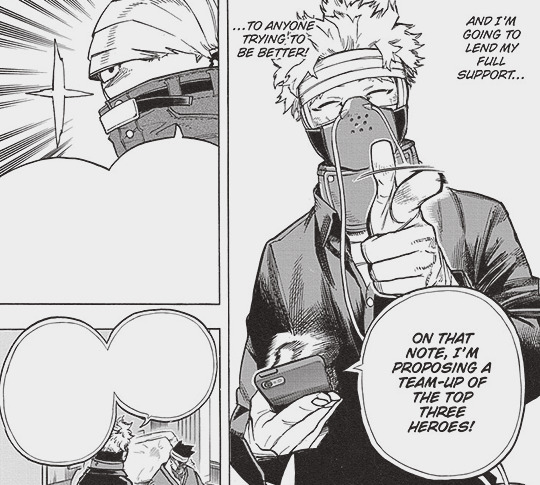
THE TOP THREE HEROES ARE ALL FAILURES
In the sense that Enjdeavor, Hawks, and Jeanist all embody the failures of the hero system. The first clear sign that all three people who were set to inherit All Might’s Legacy would fail in doing so, is that none of them really understood what kind of hero was in the first place.
Endeavor only ever saw All Might’s Strength, and thought All Might’s genuine desire to save people was just him playing to the crowd. Hawks thought Endeavor’s desire to surpass All Might was heroic, and what made him a better hero because he didn’t give up when everybody else said it was hopeless, but we the audience know Endeavor gave up early and took it out on his family instead. Best Jeanist thinks what’s most important of all isn’t saving people but rather “The Image” of Heroes to the public. Except, the only reason All Might was a hero obsessed with image is because he wanted even those he could not reach to be able to live in peace and save themselves.
The top three heroes are all lacking in what All Might had, in that none of them actually believe that Heroes should save people. Enji believes in strength above all else, Hawks in sacrificing one’s self for the faceless masses, and Best Jeanist in the image of heroes to the public.
It’s really showing that the option of “Saving Dabi” did not even occur to them once, despite the fact that they are completely willing to give a helping hand to the man who made Dabi.
The current number one, two and three heroes are all obsessed with All Might’s Legacy, however all of them are failures to All Might’s Legacy as well because they don’t understand the underlying ideal of heroes saving people. All three of them represent the failures of hero society, which is why they aren’t shown being overly concerned at hero society’s victims. Even when it’s revealed that one of hero society’s greatest villains Dabi, was actually one of hero society’s greatest victims too, created by one of their own, their beliefs barely change.
1. Enji Todoroki
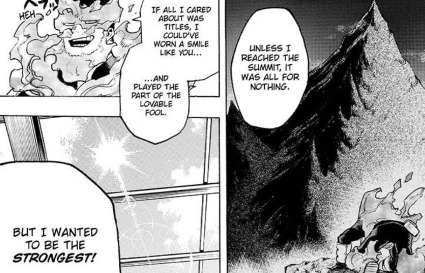
Enji was never concerned with saving others being the job of a hero. His one and only focus was just to be the strongest. He even has a shallow view of All Might’s ideals and goals because of this. He thinks the reason that All Might won number one was because 1) his all powerful strength and 2) his popularity with people.
Enji never once mentions that All Might became the hero he was, because his number one priority in every situation was to save as many people as he could. Because, Enji doesn’t view it as the job of heroes to save others.
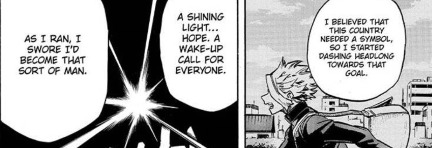
Toshinori worked so hard because he genuinely wanted to be the shining light for others. He didn’t become the number one hero because it was his own personal dream, but rather because it was others needed of him. All Might isn’t a perfect hero either, but there’s still a difference between someone who wanted the number one spot because he genuinely thought it would save the most people, and someone who wanted the number one spot because he wanted to be the strongest.
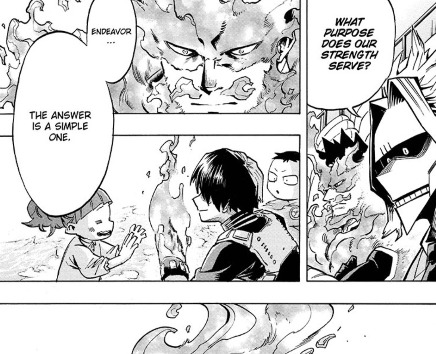
Even after Endeavor’s supposed revelation where he saw Shoto being gentle with flames, rather than forceful and violence, Enji became the exact same kind of hero he was before.
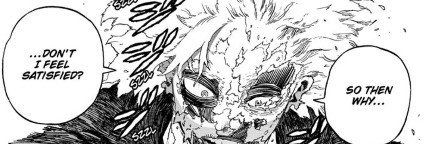
Think of the way Enji fought Shigaraki, burning him alive. He made several attempts to kill him during their fight, even though the rule is heroes absolutely must not kill, that’s what makes them different from villains. Heroes prioritize the safety of people, and saving civilians, except for Endeavor apparently. Endeavor as a hero is the exact same kind of hero he was before, and the flaw with that is if he had fought Dabi the same way he had fought Shigaraki.
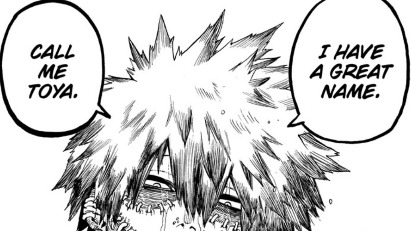
He would have burned his own son alive. Enji isn’t even concerned in the least with saving people, even when the person most in need of saving is his own son. He sees villains as an absolute evil for him to punch and beat up in order to prove his own strength. The only way Enji knows how to be a hero is violently taking down crime and no one has ever challenged this, even though it’s the exact attitude that led Toya to his death.
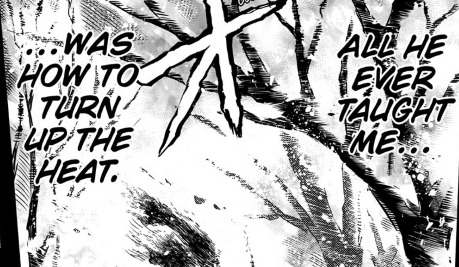
Enji, only ever taught Dabi how to turn up the heat, because Enji wasn’t actually that concerned with his son’s well being. Toya was only worth something to him when he was strong, so Enji only ever taught Toya how to be the strongest hero and nothing else that a father should teach his son. Even now, Enji doesn’t let go of this idea of his that he has to be the number one hero, and being the strongest hero will solve all of his problems.
Endeavor has used playing hero again and again as an excuse to run away. Now that Hawks is giving him another chance to be hero, he’s enabling him to run away again.
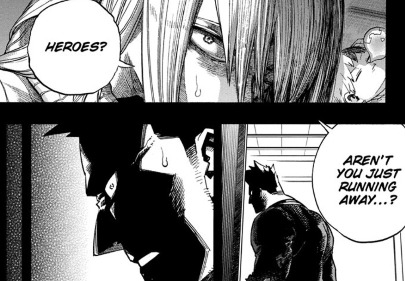
It’s incredible how still even after the reveal, it’s always Toya who has to pay for the consequences of Endeavor’s mistakes. Toya is left alone to burn to death and spends the rest of his life covered in burns forgotten by his father, and it’s Endeavor who gets the unconditional support and love Toya needed as a child offered to him, just because he happened to be a hero. If he was a villain he would have just been locked up.
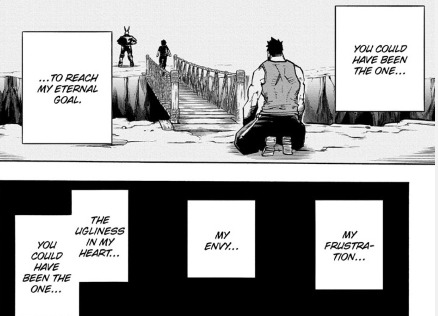
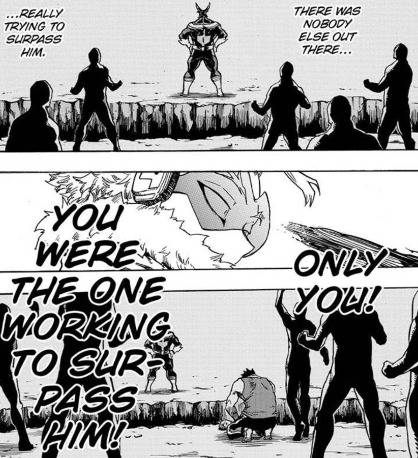
Endeavor is framed as the hero who does not give up, and yet, he very easily runs away and lets Toya take the blame for the majority of his actions. If Toya had been able to carry his dream he would not have abused Shoto. If Toya had not died that day he would not have doubled down even harder on Shoto. Toya’s the reason they could not come together as a family. It’s never Endeavor’s actions, it’s always, somehow, Toya who is blamed, and Toya who is burned as the consequence of Endeavor’s actions. Now, Toya is the one who needs to be stopped when Enji is just as guilty.
I’m not saying that Enji should not be given a chance to get better, but why is the good side of Enji’s actions expressed over and over again and not Toya’s? Toya is trying to reform all of society. Toya is trying to hold his dad accountable for abusing him and neglecting him to the point that he died. That’s murder. Someone who lets their children die because they couldn’t be bothered to supervise them can be charged with involuntary manslaughter in a court of law. Enji has killed too, but rather than admit to his own flaws it’s must easier to cast Toya s the villain that needs to be stopped and himself as the hero that needs everyone’s support.
Toya deserves the same chance that Enji got.
2. Hawks
Hawks only saw self sacrifice in All Might’s actions. He saw someone harming himself over and over again for the sake of others, and that’s probably why he admired Enji’s pursuit of strength more because it was the opposite of him.
If Enji is the extreme result of the attitude that villains can’t be saved, only stopped by putting themselves down with violence, then Hawks is the extreme result of self sacrifice. Hawks seems like the ideal hero on paper, he would do anything, and give up any part of himself to save a faceless stranger just like All Might. However, Hawks also has decided that he has the right to sacrifice others as well.

Hawks is self-destructive. That’s the extreme end of self sacrifice. However, unlike All Might who took the burden entirely on himself, Hawks will choose others to sacrifice as well. If Hawks sees himself as a tool for the greater good he will extend that to others as well. If Hawks sees himself as a bad victim who turned his back on their parents, he extends that to others as well.
So basically, Hawks’ number one problem is with himself. He can’t reconcile his past. He feels guilty for being abused by his parents. He feels guilty for not forgiving the same abusive parents. He puts everything he has into being a hero, and yet, he doesn’t feel like he himself is a hero. Hawks’ only way he knows to feel good about himself is to continuously sacrifice himself for the sake of others.
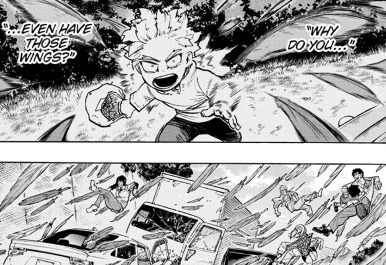
Because he learned when he was young the only way to be good was by sacrificing himself to protect others. He only received the help he needs because he showed he was “one of the good victims” but deep down internally he feels like he’s the bad one, for not being able to do anything for his mother, for not reaching out to her.
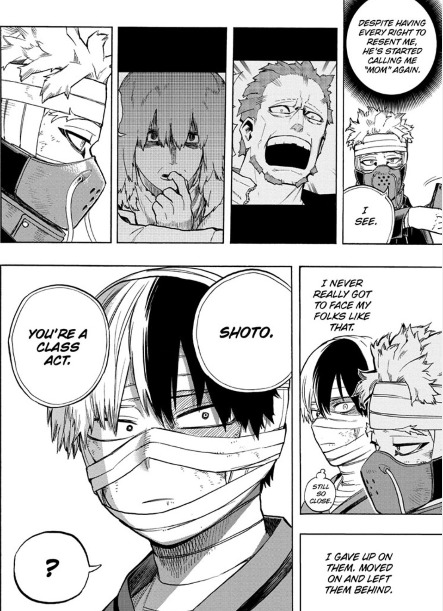
Hawks can’t see himself as a victim and it messes with the way he sees other victims as well. He divides them into good and bad, and then tells himself that he’ll offer to help the good ones, the ones willing to improve. Hawks’ represents Hero Society’s own willingness to throw the bad victims to the dogs.
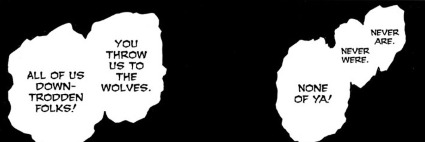
It’s specifically Hawks who Twice calls this out on. So we have a number one hero who thinks the only way to deal with villains is to violently suppress them, and the number two hero that thinks the only people who deserve to be saved is the ones he deems as “Good” or “Trying to be better.”
It’s all because Hawks has this really self destructive idea of what kindness is. That kindness is somehow destroying yourself for the sake of others, that it’s being overly forgiving and not holding any resentment at all.

It’s like how Deku acts like forgiving his father is a kind act. However, at the same time implying that holding onto resentment would be an unkind one.
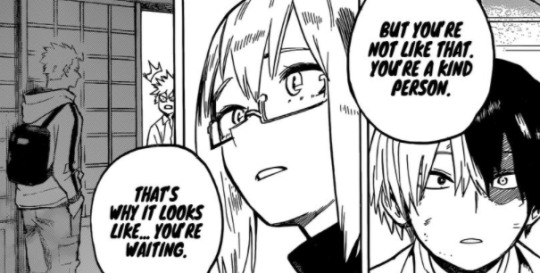
Even though the reason Natsuo won’t forgive is because Toya is dead, and Enji never showed any apparent remorse for it, and didn’t try to fix anything. Even though one son died because of Enji’s training, and then Enji just decided to train the one remaining son he had left a thousand times harder. Natsuo is attempting to hold his father accountable for his actions, but Deku acts like blanket forgiveness would be the kind thing to do.
Even though Deku himself is willing to overlook all of Enji’s past abuse of Shoto, and his murder of Toya, but at the same time stresses how unforgivable Toya and Shigaraki are.
Deku just saves people in a self destructive way. He breaks his bones to save others, thus mirroring Hawks who just saves people without genuinely thinking through who needs to be saved. They save people, because that’s the way they hurt themselves to prove how useful they are. However, neither of them actually goes through the trouble of thinking who genuinely needs saving, and that’s why they’re able to carry such a false double standard. Enji needs help because he’s trying to be better, whereas Toya’s not trying to be better. Ignoring the fact that you know, Enji tries to be better by just, forgetting everything he did in the past and sweeping his past actions under the rug, whereas Toya is still suffering from the scars of Enji’s abuse, permanently on his body.

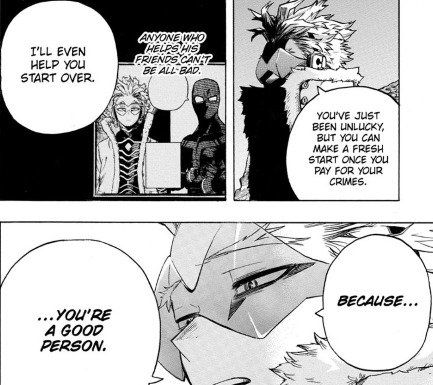
However, between Twice a person willing to die to protect his friends and act of complete selflessness, and Enji who can’t even bring himself to think that maybe he should try to save the son he let burn to death on a mountain peak which one do you think was trying to be better? Enji who spent ten years, even after Toya had already died to his training, training up Shoto instead even harsher. Enji who referred to Toya as “a failure” and “almost perfect” when talking to Shoto about his death.
“I’m going to help anyone trying to be better” is just an arbitrary line that Hawks draws.
That’s even the critique that Twice levelled at Hawks. Hawks doesn’t care because he never actually tried to see the good sides of the other people, but Toga was someone who comfotred Twice and understood him. Toga was someone who made the league feel like home. Hawks labels Twice as the only good one, because he just didn’t bother to see what was good about the other villains. Yet, at the same time he strains himself to see the good in Endeavor, to the point where he constantly apologizes for Endeavor’s actions and sweeps them under the rug. Endeavor is a good man who is just misunderstood in Hawks’ eyes, who just went wrong somewhere, but Hawks can’t ever offer up the same sympathy to the worst victims of society. Who lash out and hurt other people in the same way that Endeavor did, except Endeavor’s is excusable and there’s isn’t because...???
Hawks is in denial, because he refuses to look at the good sides of the villains. Twice didn’t choose to accept his offer of help, so obviously he didn’t want to be better, therefore Hawks is perfectly justified in putting him down. Notice though how Hawks mentioned prison time for Jin, but not for Enji (neglecting a child to the point where they burn to death is... still a crime).
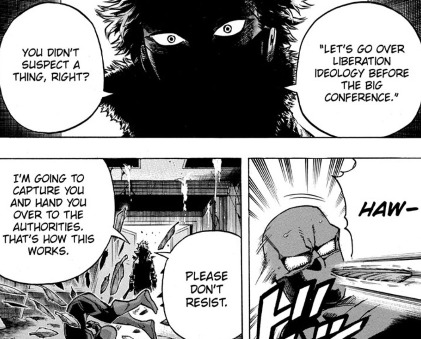
Hawks is still in denial about himself. He thinks he’s offering people a helping hand. However, from Jin’s perspective we see how manipulative he is. Hawks didn’t offer Jin a hand, he held him at gunpoint and told him to surrender and betray his friends. Hawks is just lying to himself, because he didn’t go out of his way to save Jin, he ruthlessly manipulated him, and then betrayed him. He’s not framed as a hero trying desperately to save a villain, but rather a friend betraying another friend who trusted him. Because, Hawks does not just sacrifice himself. He’s the extreme result of self sacrifice. Self sacrifice turns into self destruction. Self denial. Hawks sacrifices other people. He forces himself to dirty his hands, because he believes this is the only way he can be a hero. He’s too weak individually, so he has to manipulate, pull strings, and even kill in order to achieve the results he thinks will save the most people. However, by doing that he ignores the suffering of the victims right in front of them.
Not only that, but he ignores what contradicts his simple black and white narrative. Enji was trying to be better so he deserves help and support, Twice didn’t want to be better so Hawks revoked his offer of support away.

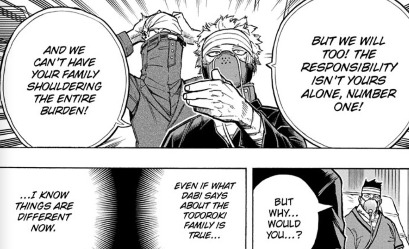
He’s willing to give support to a man who abused his family for no good reason, and who continues to evade any consequences or legal punishment for his actions, but then insists that Jin who was pushed to his actions by poverty and not wanting to starve to death just did not want to be better. He’s like, so unaware of what the problem actually is with society, he can’t possibly think why Enji leaving his own son to burn to death might have left his son a bit miffed. Enji is just a person who made a few missteps along the way but genuinely wants to be good, Dabi is just a selfish person who doesn’t want to be better, so says Hawks.
Nevermind how hard Toya tried to be a hero, and how he never gave up on earning his father’s love.
Nevermind how hard Twice tried to be helpful to other, and how much he loved the people around him he was willing to sacrifice his life.
Twice’s last action was to save his two closest friends.
Enji’s actions are always just to beat up villains to prove how strong he is. Enji is never concerned with anyone. Hawks does want to save people, but he never thinks about the people who need to be saved.
Therefore, heroes are always good. Even when heroes do bad things, Hawks contrives some way to not hold them responsible for it ever. Well, Enji isn’t like that now. Well, we don’t need to announce that Enji was an abuser, because that will just upset the public.
The actions of Enji are apologized for over and over again. Because rather than holding him accountable for his actions. Instead of pushing him to actually fix his mistakes, it’s better to keep sweeping the problem under the rug. Because, as is repeated again and again heroes don’t save people. When a hero fails to save someone, rather than trying to fix that mistake it’s easier to blame the person who didn’t get saved.
Even if it was your own son that you left to burn to death.
That is somehow miraculously alive.
That has given you a second chance to save the person you should have saved that day by just, showing up, and actually acting like a father for once.
Enji will just choose his job over and over again. Because heroes don’t actually have a responsibility to save people. Being hero is just a job. Enji, Hawks, Jeanist they consider it a profession, not a responsibility. Which is why all three of them are willing to blame Dabi for his own actions, but not Endeavor for his. Which, just proves Dabi right.
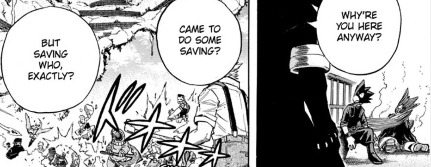
Heroes aren’t actually concerned with saving people. Heroes don’t think about who is most in need of saving, and who the real victims are. Heroes just protect their own.
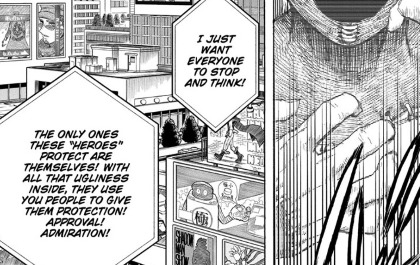
Enji, Hawks and Dabi are all murderers. They have all killed someone in pursuit of their goal. Not only did Enji murder a child by neglect, he also tried to kill Shigaraki several times over, and even tried to murder Pop Step in vigilantes. Hawks killed Twice in pursuit of a goal.
However, Hawks and Enji need to be supported, whereas Toya needs to be stopped. Because they are heroes, and Dabi is a villain. But sure, watch Dabi continually burn his own body over and over again and push himself to the very limit so he can achieve a society where another hero will never get away with abusing his family like Enji did his, and say that he doesn’t want to be good. Watch Toya burn himself over and over again as a child just trying to be a hero because he thinks it’s the only way to earn his father’s love, because he genuinely looked up to his father and wanted to be just like him, and insist that Toya just stopped trying to be better, that he was just a jealous child, that he was never good.
Jeanist isn’t a fully developed character so I’m not going to talk about him as much, but he represents the attitude that heroes “only pretend to save people” because they fuss ove image, rather than doing the actual work of helping victims.
The thing is someone who is genuinely trying to be better would listen to Dabi’s words, to Shigaraki’s words. However, Jeanist, Hawks, Enji all think of themselves as the hero, therefore they assume they are good and that their actions are good.
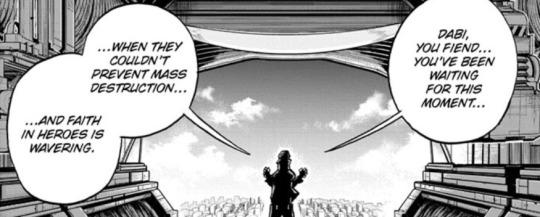
Whenever someone contradicts this, they just flat out ignore any criticism. Heroes don’t save people. Heroes just protect their own image as heroes, because they assume that’s what is necessary for peace. Even now, Hawks and Jeanist aren’t focused on the innocent people suffering from the victim break outs, but rather taking down the man out to ruin their reputations.
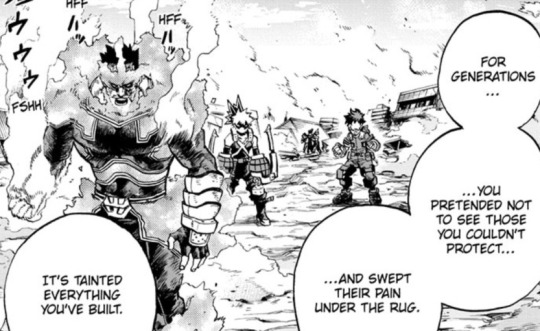
They pretend to see those they haven’t protected. Even when that person is Endeavor’s own son, his pain gets swept under the rug, because the image of Endeavor as a shining hero is far more important than the responsibility he has to help his own son, that’s in pain and need to saving.
#mha 303#mha 303 spoilers#bnha 303#bnha 303 spoilers#mha meta#hawks#takami keigo#endeavor#todoroki enji#best jeanist#dabi#todoroki toya
793 notes
·
View notes
Text

Leonin paladin:
Many forget the purpose of a paladin, seeing only the modern interpretation where they are a warrior devoted to a god, using them as a source of strength. In truth this Leonin remembers the old ways, a paladin being the exemplification of their oath rather than the hand of some divine being, offering their soul in exchange for power.
The cub years have never felt important since the oath, vague recollections of pleasant sunny plains, training with weapons to defend the family, a mother and father who are likely still with the nomadic tribe many miles away. Yet the oath was a rebirth, a single moment where he branded his soul with words echoing with such conviction that the world bent to his will.
"I bind myself to the fate of the world, the blood of all lays on my hands.
There can be no shadow without the light yet light without shadow is blinding.
Law brings order yet breeds contempt, while chaos brings life yet cultivates greed.
I walk the line of betterment for all, the knife edge of justice.
With this I offer my service to the world and demand it obey my just command"
The events that led to that moment remain unclear, but the words stay with him. He will do what he must to fulfill it and will break those that oppose him either in body or spirit.
This Leonin is stoic and proud, yet not conceited. He is in touch with mortal life in a way that gods and devils cannot and will enjoy the strength that it gives him to continue his quest.
He knows that there is no way to perfect the world or his view of it, chaos and law, good and evil, they struggle for control instead of balance. But perhaps his acts could pave the way for something better, helping the weak, counselling the strong, and destroying those that would corrupt the world to their own ends.
With this paladin it is less about the righteous hand of goodness and more about doing what is right, no matter how unpleasant it will be. You will likely topple a tyrant, free the innocent from chains, stop wars. But you will also need to be pragmatic, one life against many, the need to slay those indoctrinated into the only life they've ever known who believes almost as fervently in their ideals.
This paladin is on the fine line between the four axis of power in the universe, it is up to you whether his cause and actions are just. I would recommend a roleplay heavy campaign for this character, you can explore with your party and DM what the "right" thing to do is in the subjective and questionable world you play in.
Phew, that was difficult to put into words. I like paladins, they offer interesting perspectives and while they're typecast as holier than thou deus vult smite bois I feel they can be fun and have more to them. While gods often offer the power that a paladin may wield it is the oath that gives the paladin their strength, their souls literally coming forward to the frontline of their cause. (At least to me)
I've kept the events of the oath taking vague for you or your DM to play with, I can see it being an experiment by a secret society or simply an act of defiance at some terrible indignity. The main role of this paladin is neutral, using evil and goodness as tools for what is right for the world. He can fit into an "evil" campaign as the ends justify the means, or as a good campaign bringing goodness to the masses and revolted by evil, watching a paladin fall into being an oathbreaker can be just as impactful as watching them succeed in their goals.
This is a very long post, I hope someone found some inspiration, even if it's just one element :)
Art from:
https://amp.reddit.com/r/DnD/comments/mmpqpw/oc_art_character_commission_royorian/
I love him, proud, strong, steadfast. I can see him being the leader or central figure within a band of masterful warriors.
#d&d character#d&d#Dungeons and dragons#character concept#character design#leonin#lion#paladin#tabletop#RPG
119 notes
·
View notes
Note
Thank you for your posts on the famproc. I have to give the class on it on Sunday and I have no idea what I'm going to do. It hurts in ways I can't fully articulate. As a queer person raised by a bisexual single parent, I don't know how to relate to it. I don't know how to swing the topic around to anything loving or uplifting or good. I do not have anything good to say about the Proclamation. ... But you give me hope that I'll figure out some kind of way.
This year we studied the Doctrine & Covenants, and then in a curveball, the final lesson is The Proclamation on the Family, which seems strange since it is neither revelation nor official scripture. The Family Proclamation was made to clarify the church’s position in the wake of political and legal events that were happening at the time, most notably a lawsuit in Hawaii which could legalize same-sex marriage.
If we're going to study Proclamations, why didn't they also include the newest Proclamation on The Restoration of the Fulness of the Gospel of Jesus Christ?
————————————————————
There's things in the Proclamation which I like, and which if I were teaching this is what I'd emphasize:
We’re each divine and are loved by Heavenly Parents
Loving family bonds will continue after mortality
Children should be valued and loved and their physical and emotional needs cared for
Spouses should help each other as equals
I like the importance of following the teachings of Jesus, including forgiveness, respect, love, compassion, work, and recreation
I have several issues with the FamProc, including that queer people are intentionally absent from it as a way of erasing us from God's Plan. When this Proclamation is used in General Conference it's almost always as a way of taking swipes at queer people. Instead of being pro-family, The Proclamation on the Family is consistently used to limit what kind of families and people are acceptable.
When I view it through the lens of Jesus' teachings I find it lacking, it's very focused on modern American cultural norms.
In his April 2019 General Conference Address, Elder Anderson spoke on the FamProc and listed people who may not fit. I liked this response from the Sistas in Zion.
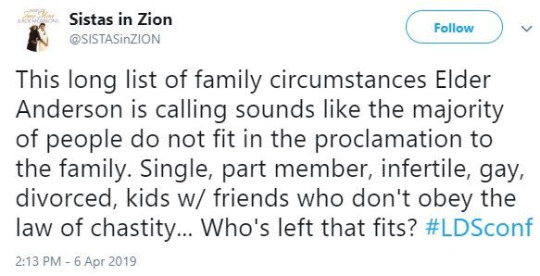
Elder Anderson's talk served to emphasize that the Family Proclamation is an ideal. The reality of many people doesn't fit the "ideal," and those ideals shouldn't turn to condemnation.
In fact, if we could take the words of this Proclamation to condemn early church leaders who were polygamists. "We further declare that God has commanded that the sacred powers of procreation are to be employed only between man and woman, lawfully wedded as husband and wife." A man and a woman, not multiple women.
I also think about the different ways we can employ these words: “WE CALL UPON responsible citizens and officers of government everywhere to promote those measures designed to maintain and strengthen the family as the fundamental unit of society.” This can mean we want better wages so people afford to get married, particularly those without a college degree. We want laws improved in regards to family leave, child care, vacation, health care, and other areas that support families. Racism negatively affects the family, we should be working to root out systemic injustice.
In church, do we give fathers heavy callings that will keep them away from home multiple nights a week? Do we call husbands and wives to a joint calling that might help them work together? Do we schedule Primary and youth activities at times that disrupt family dinners? Do we provide parenting-skills classes or give newlyweds practical advice and tools via a marriage class? For single parents, how do we bolster their ability to be a good parent? Do we help couples who want to adopt or to be foster parents?
The Family Proclamation was the understanding and opinion of the Church leaders 25+ years ago. Understandings and opinions change over time. It would be a different Proclamation if it were written in 1965 instead of 1995. And it would likely be different if written in 2025.
I think a strong statement in support of the family would be to take down the Family Proclamation from our walls and instead hang a picture of the people we love. What is more pro-family than that? Let's celebrate our family in whatever form it is.
————————————————————
Lift+Love this week discussed the Proclamation on the Family and they gave many things a person could use in Sunday School to respond to statements made about the Proclamation on the Family. I thought their suggestions were very good.
————————————————————
The Beyond the Block podcast did an episode where Derek Knox goes through the FamProc, starting at the bottom and going up, I found it very interesting. Derek was able to change the focus of the Proclamation from the way people normally think about it by using it's internal structure.
————————————————————
I have a Tumblr post from 2019 where I go through the Family Proclamation line by line and add my thoughts. I think this may be helpful for other queer people.
For example, “marriage between a man and a woman is ordained of God“ - it doesn’t say this is the ONLY marriage arrangement that is ordained of God
31 notes
·
View notes
Text
The Founders with s/o who's a civilian and has talent to people maneuvering 🗨
This was requested by @kaiseaya (thanks for it, dear 💜) and I found it very interesting to try and imagine how it would be for the Founders to have a s/o who, as a civilian, doesn’t have blatant, impressive power as them (shinobi), but has their ways to convince people of their views and make them collaborate: they are versed on the laws, bureaucracy, diplomacy and takes the advantage of social conventions to achieve their goals.
Not all warriors are ninjas, right? 😉
Fandom: Naruto | Founders
Symbols: 💗 | ◻ | ▶
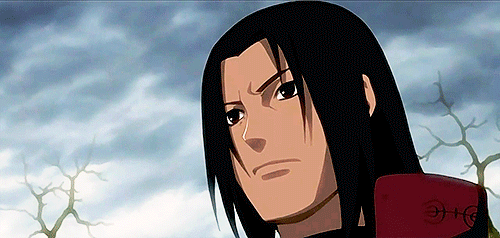
Hashirama
He met you at a diplomatic meeting
Tobirama said that they attended it alongside the most capable representatives available, and you were one of them
At first he thought that meeting was going to be as boring as the many others in which he participated since he became the Hokage, so he didn’t think much about the people chosen by his brother. You know, he hated to deal with this things so he trusted Tobirama as he wouldn’t trust himself
Things were like this until it came your time to speak. Once he saw you in action, he became interested in you
He spent the whole meeting observing and thinking about you and your talents. Your speech, your intelligence and your knowledge could only be compared to the ones of few people he knew, including his brother
However, you had something nor he or anyone else had: the sensibility you used to put in your work. He noticed you had a deep understanding of the human emotions and behavior, and used this as an advantage besides your argumentation
In other people this trait of yours could be considered some sort of manipulation, but you were not this kind of person, and that was exactly what gathered Hashirama’s attention. You were never pretentious or disrespectful, and when things started to get tense you promptly acted to calm everyone’s moods. You used your power as a way to connect people, to intermediate communication between them and thus to bring peace 💜
It was something that he himself always tried to do, but his preference to use his heart to guide his actions instead of logic and technical knowledge took the best of him and he always ended up depending on his brother’s rationality. You, on the other hand, combined the best of the two sides
Someone who achieved the perfect balance between their heart and their brain – that’s the type of person Hashirama wanted by his side. And he told you that when you met in the evening of that day
Today, he’s glad he has you with him 💕
Among the Founders, he is the one who’s less concerned about the fact that you are not a ninja. You do your work as no one else could, so why should he worry?
It’s true that when you and his brother are there to work with him, he might feel a bit intimidated by your competence, but he loves to have you all together. You three are like a team 🤝
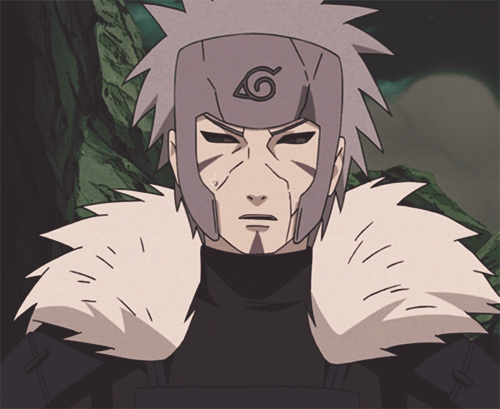
Tobirama
Working besides Hashirama and being a master of maneuvering himself, it was only natural that sooner or later, Tobirama’s path would cross yours
He had a talent for organizing tasks and delegate them to the people with the right skills to accomplish them, whether they were shinobi or not. He simply knew everyone’s place in the schemes
And this is how he met you
Some of his partners talked to him about you when a complex mission was assigned to them, and he immediately demanded your presence
He explained what you had to do and gave you the proper tools for the work, or at least the tools he thought to be the right ones, because once you’ve read the papers and analyzed the situation, you pointed out some fragile spots that needed to be revised and asked for some time to do it
Your observations caught him off guard. How could he just miss important stuff like that? Was he becoming blind?! He asked the papers back and revised the whole pile lmao
In the end you were right, and he gave you the time you needed 😜
Time passed and episodes like this happened from time to time. Tobirama never brought them to the table, but he couldn’t deny that they bothered him a bit. You know, man is proud of his own capacities, so having someone who “challenges” him without even noticing had its impact
Besides, it didn’t go unnoticed by him that you didn’t depend solely on your intellectual and technical skills to achieve your goals: you had the ability of putting some “human” touch in everything you did, specially when your work involved direct communication with groups of people. You never imposed yourself or tried to force things out of them. You just knew where and how to press, and then you had everyone at your feet
One day, when you were talking about work and such, he made a comment on how you manage to have the idealism of his brother but not his empty head without letting it blind your judgment and always prioritize facts and logic when making your decisions. You, on your turn, said that this wasn’t a big deal and that you were actually learning so much working by his side that it was good to have his acknowledgment
This conversation basically stated the beginning of your relationship ❤
Today, Tobirama says that working with you is one of his fav things in life, but let's be honest, he can get a bit jealous of you sometimes lol
This leads him to be more stubborn than he naturally is, and he starts discussing about minor things and questioning your decisions without a good reason. You’ve already had some serious arguments bc of that (Tobi for god’s sake just chill)
However, as you use to do at work, you always solve your problems with patience and open communication
He even admits that such things are hard to accomplish specially for a shinobi, a kind of person who is used to conflict above all
In the end, he's more than happy to have someone like you by his side 🥰

Madara
In this gif he’s probably wondering if you’re really a civilian or if your talent is actually some sort of secret genjutsu
You met at an encounter with representatives of other nations. Tobirama couldn’t attend the meeting, so his brother chose you to go in his place, but you weren’t alone in this: as one of Konoha’s Founders, Madara Uchiha was included among the representatives of the village
Because of your work, you and Madara were familiar to each other, but you never had a proper conversation or anything of this kind. Still, you’ve heard things about him here and there, and decided it’d be better to keep him out of your way
That’s why you weren’t exactly pleased when Hashirama came to tell you that this man was joining the group. It was when you were introduced to each other
You were formal and polite in your greetings and everything was fine, but then Hashirama stated that you were going to mediate the negotiations, since you were replacing Tobirama
The look Madara gave to you was enough for you to see he was not satisfied with this arrangement
He didn’t say a word against the Hokage’s decision, that’s true, but he didn’t miss the chance to point out that you seemed too young for such role and because of this, there was a possibility of the other nations not treat Konoha’s group with the respect they deserved
Too young = an inexperienced girl who’s not a shinobi occupying a position as the leader of negotiations with international diplomats. And yes, he suggested it right in your face he has no shame lmao
Your first instinct was to give him a harsh reply, but once you looked at him, you saw it wasn’t worthy, so you just told him to wait until the meeting’s beginning
“Maybe it is better to give them the benefit of doubt, at least for now. We do not know them yet, but once we do, we will know the best way to deal with them. We know our goals here and we will work to reach them, whether they appreciate us or not” 👊
Hashirama, who was hearing all of this, blushed (as he always does in this kind of situation), but the Uchiha just smiled and said he didn’t want to offend you and that “if the Hokage trusts you for this task, I am with him”
As expected when you are involved, the meeting was a success. Your knowledge of bureaucratic matters and ability to observe combined with your understanding of human behavior were enough to grant your village one more victory. Hashirama wasn’t even worried that his brother was not there
But that didn’t mean the end of Madara’s mistrust of your talents: if he didn’t want to acknowledge your capacities during the meeting, now he purposely refused to give you the credit you deserved, stating that circumstances worked at your favor and etc.
Yep, unfair, irritating and immature, but you know, this man the personification of stubbornness. He has a hard time seeing other people's value, specially if they’re not shinobi, so it wouldn’t be different with you, right?
It was only when you made it clear that you didn’t crave for his approval that he stopped denying what it was obvious and recognized that you deserved respect for your hard work
Yeah it never crossed his mind that someone could simply ignore his opinion but thank goodness you were good at brat handling
But it was the first step for you both get close to each other 😏
#naruto headcanons#naruto requests#hashirama headcanons#hashirama x reader#tobirama headcanons#tobirama x reader#madara headcanons#madara x reader
275 notes
·
View notes
Note
I want to hear about gay knights. Please.
Ahaha. So this is me finally getting, post-holiday, to the subject that was immediately clamoured for, when I volunteered to discuss the historical accuracy of gay knights if someone requested it. It reminds me somewhat of when my venerable colleague @oldshrewsburyian volunteered to discuss lesbian nuns, and was immediately deluged by requests to do just that. In my opinion, gay knights and lesbian nuns are the mlm/wlw solidarity of the Middle Ages, even if the tedious constructionists would like to remind us that we can’t exactly use those terms for them. It also forces us to consider the construction of modern heterosexuality, our erroneous notions of it as hegemonically transhistorical, and the fact that behaviour we would consider “queer” (and therefore implicitly outside mainstream society) was not just mainstream, but central, valorized, and crucial to constructions of medieval manhood, if not without existential anxieties of its own. Because medieval societies were often organized around the chivalric class, i.e. the king and his knights, his ability to make war, and the cultural prestige and homosocial bonds of his retinue, if you were a knight, you were (increasingly as the medieval era went on) probably a person of some status. You had a consequential role to play in this world, and your identity was the subject of legal, literary, cultural, social, religious, and other influences. And a lot of that was also, let’s face it, what the 21st century would consider Kinda Gay.
The central bond in society, the glue that made it work, was the relationships between soldiers, battlefield brotherhoods, and the intense, self-sacrifical love for the other that is familiar to anyone who has ever watched a war movie, and dates back (in explicitly gay form, at least) to the Sacred Band of Thebes. Medieval society had a careful and contested interaction with this ideal and this kind of relationship between men. Because they needed it for the successful prosecution of military ventures, they held it up as the best kind of love, to which the love of a woman could never entirely aspire, but that also ran the risk of the possibility of it turning (homo)sexual. Same-sex sexual activity was well-known in the Middle Ages, the end, full stop. The use of penitentials, or confessors’ handbooks, as sources for views or practices of queer sexual behaviour has been criticised (you will swiftly find that almost EVERYTHING used as a source for queer history is criticised, shockingly), but there remains the fact that Burchard of Worms’ 11th-century Decretum, a vast compilation of canon law, mentions same-sex behaviour among its list of sins, but assigns it a comparatively light penance. (I don’t have the actual passage handy, but it’s a certain amount of days of fasting on bread and water.) It assigns much heavier penalties for Burchard’s main concern, which was sorcery and the practice of un-Christian beliefs, rituals, or other persistent holdovers from paganism. This is not to say that homosexuality was accepted, per se, but it was known about, it must have happened enough for priests to list in their handbooks of sins, and it wasn’t The End of The World. Frankly, I am tired of having to argue that queer people existed and engaged in queer activity in the Middle Ages (not directed at you, but in general). Of course they did. Obviously they did. Moving on!
Anyway. Returning to gay knights specifically, the fact remained that if you encouraged two dudes to love each other beyond all other bonds, they might, you know, actually bang. This was worrisome, especially in the twelfth century, as explored by Matthew Kuefler, ‘Male Friendship and the Suspicion of Sodomy in Twelfth-Century France’ and Ruth Mazo Karras, ‘Knighthood, Compulsory Heterosexuality, and Sodomy’ in The Boswell Thesis: Essays on Christianity, Social Tolerance, and Homosexuality, ed. Matthew Kuefler (Chicago; University of Chicago Press, 2006), pp. 179-214 and 273-86. I have written a couple papers (in the ever-tedious process of one day being turned into journal articles) on the subject of the Extremely Queer Richard the Lionheart, some material of which can be found in my tag for him. Richard’s queerness has been argued over for a long time, we all throw rotten banana peels at John Gillingham who took it upon himself to deny, ignore, or minimize all the evidence, but anyway. Richard was a very masculine and powerful man and formidably talented soldier who could not be reduced to the stereotype of the effeminate, weak, or impotent sodomite, and the fact that he was a prince, a duke, and a king was probably why he was repeatedly able to get away with it. But he wasn’t alone, and he wasn’t the only one. He was very much part of his culture and time, even if he kept running into ecclesiastical reprisals for it. It happened. If you want a published discussion that covers some of my points (though not all of them), there is William E. Burgwinkle, ‘The Curious Case of Richard the Lionheart’, in Sodomy, Masculinity, and Law in Medieval Literature: France and England, 1050-1230 (Cambridge: Cambridge University Press, 2004), pp. 73–85. Also on the overall topic, Robert Mills, Seeing Sodomy in the Middle Ages (Chicago: University of Chicago Press, 2015).
Peter the Chanter, a Parisian cleric, also wrote De vitio sodomitico, a chapter of his Verbum abbreviatum, fulminating against “men with men, women with women [masculi cum masculis […] mulieres cum mulieribus]” which apparently happened far too often for his liking in twelfth-century Paris (along with cross-dressing and other genderqueer behaviour; the Latin version of this can be found in ‘Verbum Abbreviatum: De vitio sodomitico’ in Patrologia Latina, ed. Jacques-Paul Migne (Paris: 1855), vol. 205, pp. 333–35). Moving into the thirteenth and especially fourteenth centuries, this bond only grew in importance, and involved a new kind of anxiety. Richard Zeikowitz’s book, Homoeroticism and Chivalry: Discourses of Male Same-Sex Desire in the 14th Century (New York: Palgrave Macmillan, 2003), explores this discourse in detail, and points out that the intensely homoerotic element of chivalry was deeply embedded in medieval culture – and that this was something that was not queer, i.e. unusual, to them. It is modern audiences who see this behaviour as somehow contravening our expected stereotypes of medieval knights as Ultra Manly No Homo Men. When we label this “medieval queerness,” we are also making a judgment about our own expectations, and the way in which we ourselves have normalized one narrow and rigid view of masculinity.
England then had two queer kings in the 14th century, Edward II and Richard II, both of whom ended up deposed. These were for other political reasons, but their queerness was not irrelevant to assessments of their character and the reactions of their contemporaries. Sylvia Federico (‘Queer Times: Richard II in the Poems and Chronicles of Late Fourteenth-Century England’, Medium Aevum 79 (2010), 25–46) has studied the corpus of queer-coded historical writing around Richard, and noted that while the Lancastrian propaganda postdating the usurpation of Henry IV in 1399 obviously had an intent to cast his predecessor in as unfit a light as possible, the accusations of queerness started during Richard’s reign, “well before any real practical design on the throne […] and well before the famous lapse into tyranny that characterized the reign’s last few years. In poems and chronicles produced from the mid-1380s to the early 1390s, and in language that is highly charged with homophobic references, Richard II is marked as unfit to rule”. E. Amanda McVitty (‘False Knights and True Men: Contesting Chivalric Masculinity in English Treason Trials, 1388–1415,’ Journal of Medieval History 40 (2014), 458–77) examined how the treason trials of high-status individuals centred on a symbolic deconstruction of his chivalric manhood, demoting and exiling him from the intricate homosocial networks that governed the creation and performance of medieval masculinity.
This appears to have been a fairly extensive phenomenon, and one not confined to the geopolitical space of England. Henric Bagerius and Christine Ekholst (‘Kings and Favourites: Politics and Sexuality in Late Medieval Europe’, Journal of Medieval History 43 (2017), 298–319) traced the use of ‘discursive sodomy’ as a rhetorical tool employed against five late medieval monarchs, including Richard II and his great-grandfather Edward II, John II and Henry IV of Castile, and Magnus Eriksson of Sweden. In all cases, the ruler in question was viewed as emotionally and possibly sexually dependent on another man, subject to his evil counsels and treacherous wiles, and this reflected a communal anxiety that the body of the king himself – and thus the body politic – had been unacceptably queered. Nonetheless, as a divinely anointed figure and the head of state, the accusations of gender displacement or suspected sodomy could not be placed directly on the king, and were instead deflected onto the favourites themselves, generally characterised as greedy, grasping men of ignoble birth, who subverted both social and sexual order by their domination of the supposedly passive king.
None of this polemic produced by hostile sources can be read as direct confirmation of the private and physical actions of the kings behind closed doors, but in a sense, this is immaterial. The intimate lives of presumably heterosexual individuals are constructed on the same standards of evidence and to much greater certainty. In other words, queerness and queer/gay favourites could not have functioned as a textual metaphor or charged accusation if there was not some understanding of it as a lived behaviour. After all, if the practice did not physically exist or was not considered as a potential reality, there could have been no anxieties around the possibility of its improper prosecution.
This leads us nicely into the deeply vexed question of adelphopoiesis, or the “brother-making” ceremony argued by some, including John Boswell, as a medieval form of gay marriage. (Boswell, who died of AIDS in 1994, published the landmark Christianity, Social Tolerance, and Homosexuality in 1980, and among other things, controversially argued that the medieval Catholic church was a vehicle for social acceptance of gay people.) Boswell’s critics have fiercely attacked this stance, claiming that the ceremony was only intended to join two men together in a celibate sibling-like relationship. A Straight Historian who participated in a modern version of the ceremony in 1985 actually argued that since she had no sexual inclinations or motives in taking part, clearly it was never used for that purpose by medieval men either. (Pause for sighing.)
The problem is: we can’t argue intentions or private actions either way. We can understand what the idealized and legal designation for the ceremony was intended to be, but we cannot then outrageously claim that every historical individual who took part in it did so for the party line reason. Maybe medieval men who joined together in brother-making ceremonies did live a celibate and saintly life (this would not be surprising). It seems ludicrous to argue, however, that none of them were romantically in love with each other, or that they never ever ever had sex, because surprise, formulaic documents and institutional guidelines cannot tell us anything about the actions of real individuals making complex choices. Even if this was not always a homosexual institution (and once again with the dangerous practice of equivocating queerness with explicitly practiced and “provable” sexual behaviour), it was beyond all reasonable doubt a homoromantic one, and one sanctioned and organised according to well-known medieval conventions, desires (for two men to live together and love each other above all) and anxieties (that they might then have sex).
The medieval men who took a ‘brother’ would probably not have seen it as a marriage, or as the kind of household formation or social contract implied in a heterosexual union, but as we have also discussed, the definition of marriage in the Middle Ages was under constant contestation anyway. The church was constantly anxious about knights: their violence, their (oftentimes) lack of religiosity, their proclivity for tournaments, swearing, drinking, and other immoral behaviour, the possibility of them having sexual affairs with each other and/or with women (though Andreas Capellanus, in De amore, wrote an entire spectacularly misogynistic handbook about how to have the right kind of love affair with a woman and dismissed same-sex relationships in one sentence as gross and unworthy, so he was clearly the No Homo Bro Knight of his day). So, as this has gotten long: gay knights were basically one of the central social, religious, and cultural concerns of the entire Middle Ages, due to their position in society, their necessity in a warlike culture, the social influence of chivalry and their tendency to bad behaviour, their perceived influence over the king (who they may also have given their Gay Cooties), their disregard of the church’s teachings, and the ever-present possibility that their love wasn’t celibate. So yes. Gay knights: Hella Historically Accurate.
The end.
#history#medieval history#queer history#gay knights#long post#i have a lot more to say but yes#the old guard meta#for reference#though this post was originally written in december 2019#anonymous#ask
1K notes
·
View notes
Text
The Rights Of A Nindroid
This is chapter Two
(Chapter one can be found here.)
Enjoy! (:<
Kai paces around the kitchen, checking the clock again. “Zane said shortly after our normal breakfast time, which is at eight. It’s ten! Why is he not here yet?!”
He knows it’s unlikely that something is wrong, but he can’t help but worry. This isn’t something that normally happens with Zane…
“I’m sure he’s fine.” Nya assures, confirming his logical side. “Something probably came up. He’ll be back soon.”
“He’s never late!” Jay argues from his spot on the table, sitting on the ledge rather than in a chair- and action that Zane would scold him for, if he was home.
“If something came up, he would’ve told us.” Cole agrees as he sits down, staring at his watch. “We haven’t heard a thing.”
Lloyd chews on his lip, kicking out his legs from where he sits on the counter to occasionally mess with Kai’s pacing- something that he would normally be annoyed with, but is too concerned at the moment to actually complain. “Can we track him?”
Jay blinks a few times. “That’s… actually a good idea.” He admits, tapping at his BorgWatch. Then his eyes widen. “His signature’s gone.” He breathes out. “Why is his signature gone?!”
Kai feels himself snap to attention. “It’s gone? What could do that?” He demands, rushing over to his ginger boyfriend.
Nya taps at her own watch. “A lot of things- and none of them good.” She admits, glancing over at Lloyd.
Cole stands up from his seat. “Okay, so we know that something is wrong. We need to find Zane. How can we do that?”
Lloyd also gets up. “Jay, Nya- see if you can find any cameras that show what happened to him.” He instructs, then turns to Kai and Cole. “The three of us will go out and see if we can find any clues.” He decides.
Kai nods, practically vibrating with his worry. They need to find Zane, and they need to find him now.
With his signature missing, who knows where he is…
{ { { { { { { { { { ~ } } } } } } } } } }
Zane is instantly alert as footsteps come closer, and he tenses, preparing to make an escape. He may only get one chance, so he must use it wisely.
When the door opens, he surges forward, using his cuffed hands as a form of bludgeoning weapon.
Much to his dismay, the guards seem to have been expecting that, and no one is there- they had opened the door while standing to the side, leaving the direct forward empty. This results in him stumbling, as there is no force opposing his attack.
This stumble allows the guards to catch him once again, rendering him once again helpless to the whims of his captors.
Despite the way he struggles, they still manage to bring him into a new section of the facility, and-
Zane feels his eyes widen as he comes to a realization of what this room is likely meant for, given the things inside.
A workshop. This in itself would not normally be a cause for alarm, but given the specific tools and the way the work table has restraints…
He picks up his struggling once again, this time finding it within himself to speak.
“Stop! Let- let go of me!” He demands, unable to hide the quiver in his voice. The tools themselves are not inherently threatening; Jay has used many of them in his repairs. However, these circumstances are vastly different from the way his boyfriend would fix him after a mission.
“Stop, I said! Release me!” His pleas fall on deaf ears, it seems, because he is still taken to the table, his handcuffs hooked on a piece of metal and clamped in place, forcing his arms above his head. He attempts to kick the guards, but his legs are restrained just as quickly, leaving him helpless to whatever fate awaits him.
Without any words, the guards leave the room, save for two, one at each of the doorways that could have served as escapes if not for the way he had been bound to the table.
A new man comes up to him, dressed differently from the officials or guards, instead wearing an outfit more suited to a mechanic.
The man comes up to Zane, pulling apart the top of his gi to get to his chest plate.
“Wait!” Zane shouts, struggling in his bonds. “You can’t-“ He fumbles for words, too panicked to figure them out. “Please, stop!”
The man doesn’t listen, instead choosing to open up Zane’s chest plate the rest of the way. Unfortunately, it seems that they had thought this through- he’s almost completely immobilized.
“This isn’t- stop it! Let go of me!” Zane demands, despite knowing that if they’ve come this far, there is only an infinitesimally small chance that they would genuinely listen.
“Please!”
In a surprising but very relieving turn of events, the man does pause in his work, turning and calling out to one of the nearby guards.
“Should I mute its vocals?” He asks.
Zane closes his mouth fast enough that there’s an audible click. Mute him? They- no, they couldn’t do that! He- no, they… they can’t…
He’s not an it, either. He is capable of conscious thought, the same way a human would be. Where did they get the idea that he’s lesser? Despite being mechanical, he’s always been on par with the intelligence of humankind. Why would they think otherwise? There isn’t any evidence to support the idea that-
A wire being tugged on draws him from his thoughts, warnings popping up in his vision to emphasize the issue- though it’s not as though he didn’t notice himself.
“Stop it!” Zane snaps, straining against the bonds that hold him once again. They may attempt to harm him all they wish, but he will not allow this to happen so easily.
His words are ignored. “Give me that scanner, yeah?” The man calls towards the other doorway; the one that Zane had not entered through. “I’m gonna need it; its system’s more complex than we thought.”
A loud sigh comes from a young woman as she steps into the workshop. “I’m going to need it back.” She warns, handing the brunet the device.
The man turns back to Zane. “Yeah, I’ll give it back after this shift.” He confirms.
With a nod, the woman heads back into the side room.
The man returns to examining his wiring in such a way that makes Zane feel almost as though he’s some form of lab rat; a lesser being used for experimenting on.
It is not a pleasant feeling.
No matter how he strains and attempts to resist, no progress is gained, and he remains quite firmly trapped.
Eventually the man seems to grow tired of him, and roughly clangs a tool against one of his sensors, tearing a cry from him.
“Behave, nindroid.” He snarls. “I don’t have time for your delusions.”
“I am beginning to grow tired of this assumption that I am lesser.” Zane snaps. “I am just as sentient as any human, and I expect to be treated as such!”
A wrench is used to hit him across the face, hard enough that his head is roughly forced to the side, slamming into the side of the table.
Zane clenches his teeth and turns back to the man, preparing to unleash a rant- but something peculiar happens.
The man turns to a guard. “Yeah, this one will need training too.” He sighs. “Was kinda hoping it’d behave.”
“Training?” Zane questions. “What is that supposed to mean?” An edge of unease has crept into him. Something is telling him that the ‘training’ he’s referring to will not be pleasant.
No matter what he does, he’s ignored for the rest of the time- his words and attempts at resisting aren’t even acknowledged.
That is quite odd, but Zane would not put it past them to be finding enjoyment in his suffering- he’s found that some humans have the disturbing habits of putting salt on snails and squashing bugs solely because they have power over what is considered a lesser being.
They have blatantly stated that they view him as worth less than humankind- that point was quite firmly driven home by the use of the pronoun ‘it’ to refer to him. Due to the circumstances, it seems that all he can do is hope that they treat him with at least the dignity given to most kinds of laboratory animals- there are laws in place that allow the majority of non-human living beings that are tested to be treated humanely.
Yet even that seems unlikely. Such laws only apply to vertebrate animals, and while not explicitly stated in the legal documents, it is quite heavily implied that this only applies to organic life forms.
This is… less than ideal. Even so, he will do his best to power through until the others come for him- he had informed them that he would only be slightly late. It will not take long for them to realize that something is wrong.
They will come for him. He will just have to be patient… and pray that his captors do not plan to disassemble him fully in the meantime.
#zane julien#zangst#ninjago zangst#fanfiction#ninjago fanfiction#the rights of a nindroid#psychological torture#torture#trauma
38 notes
·
View notes
Text
The Fetishization of the Working Class
The left is mired in identity politics. While leftists often express their opposition to systems of domination based on class, gender, sexuality and race, they tend to oppose such systems by accepting and reinforcing the very identities created and imposed by such systems of domination. While all such identities are problematic, I believe that none of them is as harmful as the left’s idealized and fetishized identity of “the worker”.
The working class as an identity differs from identities such as identities based on gender and race in the sense that a worker is an actual thing that exists apart from how we define it(as opposed to a “black” person or a “woman”). That being said, the worker only exists as long as he reproduces social relationships that define him as a worker. The moment he stops working he ceases being a worker. But why do I consider embracing the working class identity to be so harmful?
Before we get into that, let’s look back at the creation of the working class and the working class identity. We can trace the birth of the working class back to the dawn of the industrial revolution in England, which needed a disciplined workforce to run the factories that were emerging like mushrooms after the rain. There was, however, one major problem for the owners of these factories: nobody wanted to work in them.
Peasants preferred to work their plots of land, and autonomous artisans wouldn’t dream of submitting themselves to the nightmarish factories. Both saw wage labor for what is is: paid slavery. Unfortunately, the state and the bourgeoisie were determined to turn both peasants and artisans into workers, and they had the tools and the power to accomplish that. Land enclosures robbed peasants of their lands, creating a mass of landless vagrants. Anti-vagrancy laws forced these ex-peasants to chose between being criminalized or reduced to mere cogs in an assembly line. Mass-produced goods out-competed artisans, and the creation of the modern police made sure that the population was proletarianized whether they wanted it or not.
This process sparked a wave of resistance. The most emblematic revolt against the new conditions being imposed was the Luddite uprising, when textile workers and weavers rose in revolt against industrialization and proceeded to destroy as many machines as they could. Eventually, the uprisings were put down and people were forced into becoming workers.
The shared experienced of being forced into becoming workers and of working together under grueling conditions (16 hours work journeys, miserable wages, poor workplace safety, etc) forged a solidarity among the first wave of proletarians, which created the conditions for the birth of the labor movement.
Accepting their new role, workers began to organize and fight for better conditions. Struggles for better wages, working-hours and for the legalization of unions took place, and the tactics of the infant movement began to develop. Working class solidarity grew, and the identity of the worker slowly took hold upon the new class as new ideologies were developed around it. These are the ideologies that eventually gave rise to the modern left.
It is in this context that socialism appeared. As a critique of capitalism emerged from worker struggles and from the thoughts of socialist thinkers, the bourgeoisie was identified as an enemy of the working class. From this perspective, visions of struggle and “liberation” began to emerge. The most well known of these perspectives is that of Karl Marx, which originated marxism. Marx recognized the antagonist nature of the relationship between classes, and sought to create a vision that could lead to a stateless and classless society (which he termed communism). His revolutionary subject was the working class, which Marx believed to be the only inherently revolutionary class under capitalist soiety. The non-workers who were excluded from the system were seen by him as crude “lumpens” with no revolutionary potential.
According to Marx, workers should seize the state through a violent revolution and create a “proletarian” (and socialist)state. With the state in their hands, workers would dismantle capitalism and speed the development of the “productive forces”, which Marx believed are being held back by capitalism. As the socialist society ran it’s course, the state would supposedly become increasingly unnecessary and wither away (although no marxist ever made clear how this process would actually happen).
Bakunin and other anarchists living at that time (correctly) predicted that the takeover of the state would simply create a class of state bureaucrats that would become a new self-serving elite. This critique was essential to the development of anarchist theory and praxis, which views the state as an inherently oppressive institution that cannot be used for liberating purposes.
That being said, both Marx and Bakunin (as well as socialists/anarchists at the time with very few notable exceptions) believed that the productive forces should not only be maintained but also developed. Not only they failed to identify the inherently oppressive nature of industrial technology, they also failed to see that workers can never be liberated as long as they remain workers.
Much time has passed since then, but the left still glorifies and fetishizes industrial society and the working class that keeps it running. Even the vision of the most “radical” elements of the left (contemporary revolutionary socialists and left anarchists)refuses to go further than the idea of a society where the means of production are administered by the working class. But what good is it to get rid of the bourgeoisie if we are still enslaved by work, civilization and industrial technology? Should I be exhilarated at the possibility of managing my own misery instead of seeking to abolish it?
And why should I look upon the working class as “The Revolutionary Class” when the vast majority of the working class would defend industrial society with teeth and nails even though it is the source of their misery? Now, don’t get me wrong. In the struggle between the bourgeoisie and the working class I will always side with the working class. That being said, I cannot envision more than a small fraction of the working class rallied behind a true liberating vision, not when most workers cannot even imagine (and wouldn’t want) a world free from the shackles of industrial civilization.
And how can the “radical left” claim to fight for the liberation of the working class when most workers don’t want to be liberated? If forced to choose between the radical left and their capitalist overlords, most workers will side with the latter (not to mention the increasing number of working class folks who are willing to turn to fascism in response to an increasingly crisis-ridden world). You can always claim that this is simply a matter of educating workers so they can see their own oppression, but it doesn’t change the fact that you cannot speak for those who would never wish to be represented by you. Also, Seeing workers as mere pawns of capitalist propaganda is a patronizing and elitist attitude which denies people their agency as individuals. Yet, such attitude is prevalent among the left.
This is not to deny the social dynamics that are at play shaping people. What we can accomplish as individuals is always limited by our social environment. Yet, if we are nothing more than products of our environment with no individual agency,there isn’t even a point in trying to oppose society.
Either way, it is clear that the left’s ideas about the working class and its revolutionary potential are as irrelevant as their ideas about revolution and “liberation”. The working class can only be liberated to the extent that it is destroyed and transcended. As for me, I will side with members of the working class that are willing to rise up when it suits me, but I won’t let off the hook those that get in my way. As for those who refuse to be molded into workers and are willing to steal back their lives, they can always count on my strength and solidarity.
74 notes
·
View notes
Text
Why everyone needs to stop what they’re doing right now and watch Gargoyles...
1994 blessed us with a rare gem of television: Gargoyles. It had the perfect blend of good story telling, character development, cultural representation, mythology, fantasy, action, romance, and timeless themes. It has stood the test of time. At the very heart of the story is a message that I feel everyone in today’s cultural climate needs to hear and remember...
Forgiveness and compassion are the only way forward to peace and change.
For those of you who aren’t at all familiar with the story, I shall attempt to summarize the intricate plot. In 994 AD, a clan of gargoyles, stone by day and living beings by night, protect a castle in Scotland. When the castle and the gargoyles are betrayed and many of them killed, a spell is put on the survivors that puts them in an eternal sleep (broken only if their castle rises above the clouds).
Fast forward 1000 years. A wealthy owner of a multi-national organization hears of the legend and moves the castle and gargoyles stone by stone to the top of his Manhattan skyscraper. Come night, they revive for the first time in a millennia, finding themselves in a world much changed. Humans no longer believe that gargoyles ever lived, and they find themselves alone and disoriented.
The leader of the gargoyles, Goliath, soon meets an NYPD detective, by the name of Elisa Maza. Like all modern humans, her initial instinct upon seeing the monstrous creature is one of fear. She recoils from him, accidentally falling off the battlements of the castle. Naturally, he swoops down and saves her, then climbs back to the top with her clinging to his back (because gargoyles can’t fly, only glide). He tells her to trust him. She listens to his story and decides to befriend him, immediately resolving to teach him and his kind how to live in this modern world. Thus begins a wonderful relationship.
Gargoyles have one primary purpose in life - to protect their demesne from enemies by night. Goliath and the Manhattan protectorate soon learn that those who threaten the peace are not in the form of foreign invaders, but the very citizens of the city who refuse to abide by human law. They partner with Elisa to help control the crime in the city (ranging from scaring off would-be purse snatchers, to busting up protection rackets, and of course, battling the super villains who want nothing more than for all of humanity to be destroyed).
But everywhere they go, the people of the city treat them with fear and hatred - even the ones they help. With few exceptions, the gargoyles are viewed as monsters. Granted, the gargoyles have to keep a low profile due to their vulnerability during the day - so the humans don’t really know much about them. Even so, the ones who do get a chance to meet them tend to view them as nothing more than tools to be used or beasts that deserve eradication.
Goliath knows that humans fear what they do not understand. He acknowledges it and accepts it, but he never stops hoping and striving for a world where his race can live in harmony with humanity - as equals. No matter how many times he and his kind are betrayed, shunned, and mistreated, he forgives them and moves forward. Though occasionally tempted to vengeance when his family and loved ones are killed or attacked, reason always prevails over hatred. He never stops protecting them. He never stops valuing them. And because of his respect and eventual love for Elisa, he knows that humans are capable of understanding and accepting one such as he.
Elisa, for her part, is the ideal person to befriend a justice oriented race of beings. She is a cop, after all. She takes her oath “to serve and protect” very seriously. When she sees injustice, she won’t stop until it’s dealt with. She works within the confines of the law (but also tolerates the gargoyles bringing a heavy hand on criminals caught in the act).
Elisa is also uniquely able to see through to the heart of her strange friends because of her own background. Elisa’s mother is Nigerian and her father is a Native American. Her father was also a police sergeant. They forged a strong marriage, despite many ethnic and cultural differences, and raised their three children to see past appearances and stereotypes. When their son ends up having a drastic appearance change (thanks to the reckless experiments of a mad scientist), they quickly overcome their shock and accept him as he is.
Similarly, Elisa begins to fall in love with Goliath, despite the difference in their race. Just like many people on the show, some viewers see this relationship as problematic because it condones “bestiality” or “monster-f***ing”. If you can watch Gargoyles to the end and believe this - congratulations, you missed the point of the whole show (and you might struggle with racism). One, Goliath is not an animal, so bestiality is not an accurate descriptor. If Elisa had fallen in love with lovable gargoyle/dog Bronx - that would have been bestiality. Furthermore, Goliath is not a monster. He is an intelligence, deep-thinking, compassionate, forgiving, and honorable person. His outside appearance and unique culture is the only thing that separates him from other humans. Elisa sees that and accepts it, though she struggles with her feelings for him for a long time. She eventually decides that the obstacles to their relationship cannot stand up to the depth of their love, respect, devotion, and trust in each other.
Goliath has fewer reservations than she does, but I appreciate that the show made a point to reveal to us that Goliath did not find her attractive from the beginning. Her human form was not appealing to him and it wasn’t until she was temporarily transformed into a gargoyle that he noticed her beauty. In the same way that she saw past his looks to the heart of him, he also saw past her appearance to the heart of her. It was their love of people, their insatiable desire to protect, and their strong sense of justice that made them so compatible. Though both have their flaws, like all of us - they face their demons, take ownership of their failures, and extend grace to each other and their enemies.
I look around me today and listen to the words that people are saying to each other (particularly on this very website), and I wish that more people could be like these two. Instead of looking at the color of a person’s skin or the uniform they wear and making assumptions about their thoughts, beliefs, or character, we should all attempt to get to know people as individuals. I wish we would stop clinging to our self-assigned clan labels, whatever those may be (white, black, cop, civilian, privileged, minority, etc.). I wish we would realize that we are the same in all the ways that truly matter.
I wish we would look at the injustice around us and unite to stand against it - instead of creating more injustice by responding to crime with more crime, hate with more hate, racism with more racism, bigotry with more bigotry. I wish we would look at humanity and recognize that while racism and bigotry will always exist in the hearts of some, most people are eager to look past our differences and bond over what we have in common, if given half a chance. I wish we would learn to forgive the faults of others and acknowledge our own. I wish we would take more chances on people.
Violence, protests, vengeance, and anger will not move us to a place of unity. They have their place. Injustice should incite righteous anger. But we can’t dwell in a place of hatred and hurt. At some point, we must forgive and extend a hand to the people across from us. Relationships are the only way forward to peace and unity.
Many “white” people don’t understand the “black” community and vice versa. Many civilians don’t understand the police community. It’s so easy to look at evil people from both groups and extrapolate stereotypes to everyone in those groups. And that WILL NOT END until we stop generalizing and trying to dehumanize each other. Get to know some people who look different from you or live in another neighborhood as you. Get to know some of the men and women who took an oath to serve and protect everyone in their communities (like Elisa Maza) and decide if denying them their calling is the answer to our problems.
In Gargoyles, there are three races: Fey, humans, and gargoyles. Humanity is treated as one race. I think it’s high time we started thinking that way ourselves. Though humanity has great ethnic and cultural diversity, we are the same in all the ways that truly matter.
>>>>>>>>>>>>>>>>>>>>>>>>>>>>>>>>>>>>>>>>>>>>>>>>>>>>>>>>>>>>>>
Goliath: I still don't understand how Dracon could ever believe that you would turn to a life of crime.
Elisa Maza: I guess the corrupted are the first to believe that somebody else can be corrupted. And it's not impossible. None of us are perfect, that's why we need protection, even from ourselves sometimes.
Goliath: Then I will protect you, you will protect me, and together we will protect this city.
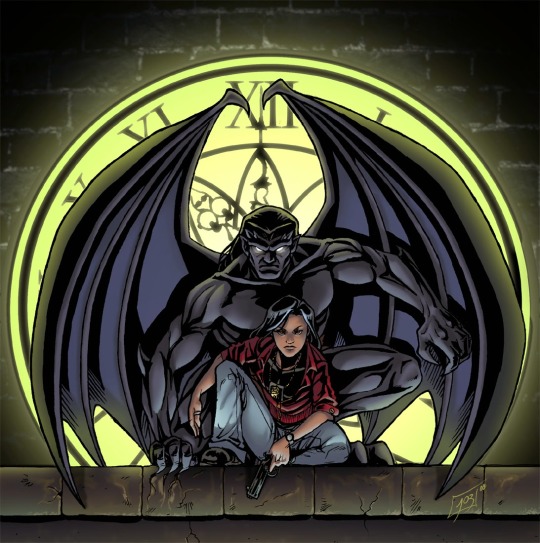
#gargoyles#racism#peace through unity#black lives matter#blue lives matter#gargoyle lives matter#sometimes a kids tv show from the 90's has more wisdom than half the people posting on tumblr#stop the violence#forgiveness#compassion#one race#the human race#stand up to injustice#if you are spreading hate you are part of the problem#if you dehumanize people who don't believe the same as you - you are part of the problem#love your enemies#do good to those who persecute you#treat others the way you want to be treated#be the change you want to see in the world
97 notes
·
View notes
Link
Findings from a nationwide survey commissioned by Yangon-based NGOs Colors Rainbow and &PROUD indicate that Myanmar’s general public are in favour of greater equality for the country’s LGBT* population, and that a strong majority of people do not support the current criminalization of LGBT people.
With an election around the corner (featuring the country’s first openly gay candidate), activists in Myanmar will soon be presented with a renewed set of policymakers with whom reform can be pursued. The strategic use of this new public opinion data can play a critical role in convincing the Myanmar government to dismantle laws that justify discrimination and marginalization of the country’s rainbow folk – but there are hurdles ahead.
The push for LGBT equality in Myanmar takes place within a broader context of increased attention on sexual and gender minorities across the Asia Pacific region. Positive examples include India’s dismantling of anti-sodomy laws in 2018 and Taiwan’s recognition of same-sex marriage in 2019. Elsewhere, however, there are some more worrying cases, such as Brunei’s near-instalment of the death penalty for homosexuality, public officials spouting anti-LGBT vitriol in Indonesia and Singapore’s high court quashing an attempt to decriminalise male same-sex relations.
In all cases, strategically aligning political maneuvers with broader public sentiment has been the goal of actors on both sides of the battle. In the post-election environment, the same will be true in Myanmar. As such, it is critical to understand the general population’s perspectives on sexual and gender minorities, in order to inform campaign strategies and messaging.
In Myanmar, ‘LGBT’ is the term used to describe sexual and gender minorities, rather than the longer and more inclusive form of the acronym – LGBTIQ – that is more common in Western rhetoric and advocacy. Accordingly, to align with the Myanmar context, this study and subsequent analysis uses the term ‘LGBT’. In any case, both acronyms are rooted in Western conceptualisations of sex, sexuality and gender that do not always perfectly translate into Myanmar’s cultural or linguistic realities.
In Myanmar, people of diverse sexualities and gender identities face human rights abuses and violence on multiple fronts for not conforming to culturally-entrenched understandings of gender norms and behaviours. LGBT individuals frequently suffer physical, sexual and emotional abuse at the hands of family and household members, and others in their communities such as law enforcement officers, neighbours, teachers and classmates.
Such cases are rarely taken seriously by Myanmar’s authorities. This reality was made clear following the highly publicised suicide of 26-year-old gay librarian, Kyaw Zin Win, who took his life in June 2019 after being forcibly outed and bullied by his colleagues. The Myanmar National Human Rights Council dismissed any wrongdoing and instead attributed the youth’s death to his own ‘mental weakness’. Inevitably, such views are bolstered by the ongoing existence of the colonially-introduced Section 377 and associated police acts which serve to criminalise same-sex relations and enshrine binary, heteronormative gender ideals into Myanmar’s legal system.
The objectives of Colors Rainbow and &PROUD’s research were two-fold: i.) to produce Myanmar’s most comprehensive stand-alone study on public attitudes towards LGBT people; and ii.) to inform community-led campaign strategies to promote greater acceptance and support of the LGBT community. The study was conducted by mobile phone using the proprietary research panel of a locally contracted research agency, and respondents were representative of the population across demographics such as gender, age, location and education.
By far the most salient findings for LGBT activists will be the fact that 74% of respondents did not agree with the criminalization of LGBT identities—indicating that if handled sensitively, dismantling Section 377 and the relevant Police Acts will not be a publicly unpopular action for the government. Even more reassuring is the finding that 81% of people agree with the statement: “I believe LGBT people deserve equality and equal treatment just like anyone else in Myanmar”. This finding is particularly interesting to note alongside the fact that 31% of people did not agree with the more personal statement “I accept and support LGBT people”. We can conclude that despite personal prejudices, a belief in equality and equal treatment for all people seems to take precedence.
Indeed, it must be noted that people were more willing to accept LGBT people in an abstract sense, but less so when the person in question was closer to home. One in two respondents expressed it would be completely unacceptable if their own child was LGBT, while a similarly high number indicated an unwillingness to accept an LGBT sibling.
While the results are reassuring for LGBT activists insofar as that they demonstrate solid public support for legal reform, they also unearth some unignorable tensions. Most glaringly, the lack of support and acceptance for LGBT children or family members reveals that for many, LGBT people are only acceptable at arm’s length. This demonstrates a need for advocacy and campaign strategies that can emotionally compel people to unconditionally support and welcome LGBT people in both their public and private lives.
Furthermore, while it’s a powerful tool, demonstrable public support alone will not be sufficient to achieve legal reform. Separate lobbying will need to take place behind the scenes with Bill Committees and parliamentarians before substantive actions can be taken. Led by Colors Rainbow and the LGBT Rights Network, this work is indeed already underway, but the process is not as easy as convincing lawmakers to strike a line in the rule books. For example, a major issue in the Myanmar Penal Code is that the current definition for rape (Section 375) only holds in heterosexual circumstances, with same-sex intercourse being illegal whether consensual or not. Thus, if consensual same-sex relations are decriminalized, lawmakers will need to redefine rape to include non-consensual intercourse between people of the same sex, which means that three intertwined sections in the Penal Code will require examination and amendment.
What is clear in the road ahead is that securing human rights for Myanmar’s queer folk will require attention being paid to both social and legal realms. In battlefronts for queer equality across the globe, negative voices and violence can and do drown out quiet support and acceptance. Nevertheless, this data indicates that there is in fact widespread belief in the inherent right for LGBT people to be treated with dignity and respect. Myanmar’s LGBT community needs to find ways to activate positive voices within the general public and amplify human faces and stories within the debate.
A full analytical report detailing all the findings of the survey will be released later this year in both Burmese and English language.
* In Burmese, the word for intersex is not widely understood by the general public, and intersex issues have not been mainstreamed into the existing LGBT movement. As such, this study was regrettably not able to cover intersex experiences and realities in a cohesive or comprehensive manner. Nevertheless, both Colors Rainbow and &PROUD are working towards awareness-raising, advocacy and programming that addresses the needs of intersex people and encourages their participation in the movement.
12 notes
·
View notes
Text
i love ds9 and here are some episode premises that i wish had happened
DND EPISODE: already talked about this but a dungeons and dragons holosuite episode. jake is the overly prepared DM obviously, nog, ziyal, and alexander are players. nog’s player is clearly his idea of sisko, a lawful good paladin; ziyal plays as a cardassian rogue (played by dukat, but clearly based in personality on kira); alexander plays a mage who is kind-of worf kind-of jadzia and keeps switching between them through the game). there’s an NPC version that’s clearly also based on sisko at one point, but from jake’s point of view knowing him as his dad to compare how differently jake and nog, a cadet, see him.
as the game progresses, it becomes clear that the Big Bad is based on a combo of dukat/winn (corrupt government/religious figure). ziyal struggles with the classic DND question of ‘just because i would do this, does that mean my character would?’ except she’s realizing that her dad wouldn’t do any of the selfless things she wants her character to do. alexander keeps trying to solve shit through weird cantrips or puzzle solving instead of fighting and jake is like ‘it’s not deep it’s just a cave bat please roll initiative’. bashir and garak show up as like, the old couple from the princess bride and everyone has to be like ‘jake they’re not dating in real life this rpf shit is kind of inappropriate’ and he’s like ‘wait what? i thought they were dating’. miles is an NPC and dies. nog thinks jake’s-sisko-npc is too silly and disrespectful and jake is like ‘he’s MY dad’ and they have to take a break to argue about it and jake is like ‘your dad is cool too’. nog’s character changes to lawful good paladin rom. actually this whole game is ‘arguing about dads’ time now that i think about it, which jake is not really equipped to jump in on since he has a normal cool dad who he basically just thinks is embarrassing because he’s the ~messiah~ or some goofy bullshit. ends with them calling it a day after the final boss battle and then jake and nog privately talking about whether or not they can trust ziyal if she has to choose between ds9 and dukat, which was an ulterior motive of the game. ziyal is clearly clearly rattled by what the game made her realize and goes to see kira, who she doesn’t tell about the game but who still gives her a hug, and ziyal realizes that kira’s her hero (and like, her mom). alexander tells worf and dax about the game and dax thinks it sounds fun as hell and asks alexander if they can come next time, and worf is like ‘....... only if i can be a blood mage’. nog and jake go home and tell their dads they love them.
shit i blacked out
PRANK WAR EPISODE: escalating series of pranks starting with jadzia putting hair dye in bashir’s shampoo and ending with the space station accidentally going into a meltdown self destruct scenario. garak is torn between helping jadzia and quark, who are clearly the better pranksters, or helping julian and odo, who suck at pranks but are his lunch friends. everyone has to tell garak that he’s way too intense about ‘pranks’ which are actually just really dangerous booby traps he puts in people’s quarters. sisko ends the episode by grounding everyone; no holosuites for a month!! yes even dax
GREAT RACE EPISODE: there’s some kind of macguffin resource on a planet (a klingon escape pod with a survivor with crucial intelligence information?), but they can’t teleport directly to it. a vorta and jem h’dar team and a ds9 team beam down on opposite sides of its location and are both racing to get there first, having to macgyver together vehicles and tools on the way. lots of excellent outdoor on-location settings and comparison of the jem h’dar/vorta dynamic and the ds9 federation dynamic. ends with the jem h’dar almost winning but turning on the vorta at the last few yards, and sisko’s team beams out as the jem h’dar chant victory. no i refuse to think this is same plot as ‘the ship’ or whatever
KASIDY EPISODE: set earlier in kasidy/sisko’s relationship, kasidy agrees to go with jadzia as a third-party observer to negotiations with a nearby bajoran colony over a trade agreement with the federation. jadzia and kasidy bond over gossiping about sisko on the way, but once they get there kasidy disagrees with the starfleet’s contract during negotiations which causes tensions, and recommends that the bajorans reject it. she and jadzia get into an argument about starfleet and its ideals, and why kasidy chose to be an independent captain rather than a starfleet captain, and how that doesn’t make her lesser than starfleet captains. jadzia realizes that kasidy is right and petitions superiors for a new contract, which kasidy approves of. they go home tenser then when they left, but when sisko asks jadzia what she thinks of kasidy, she very seriously says that she has incredible compassion, intelligence, and integrity, and that she doesn’t need or want jadzia’s approval. but has it anyway
MUSICAL EPISODE: someone already outlined a great musical ep where lwaxana comes in with a betazoid cold and it makes everyone burst into song in another text post and like 100% cosigned
SHAKESPEARE EP: holosuite shenanigans; every character is suddenly stuck as someone from a different shakespeare play. garak is an enthusiastically combative beatrice, kira is cordelia, worf is hamlet, jadzia is a very amused katerina, julian is puck, miles is duncan (”i get MURDERED?”), odo is benvolio and kind of bummed he’s not romeo, etc. i actually don’t know any shakespeare play that well but i think it could be neat. julian is the only fucking person on ds9 who actually knows any of it well enough to figure out what’s going on, except for sisko who doesn’t really care for shakespeare but generally knows about the plays (maybe a good opportunity to talk about the racism in most ‘classic Earth’ pop culture that star trek tends to uphold without criticism). i don’t know shit about the 40 plays that shakespeare wrote about british kings but i could see sisko ending up in that kind of intense role and refusing to play into it, as do the rest of the characters who refuse to fulfill their respective roles and instead find another way to end the program.
KLINGON OPERA EPISODE: goodddddddd can we see some klingon opera, mac. i’ve been dying to see some klingon opera. premise is they believe that someone is assassinating ambassadors and so they tag along with a andorian ambassador who loves opera to see if they can figure out who the assassin is, however the andorian plays it down as over-worrying and that they should use it as an excuse to enjoy themselves. worf and jadzia go and have a lovey dovey time, sisko and kasidy go and have a lovey dovey time watching worf and jadzia get super into the opera together. julian is asked to go in case there’s poison used or first aid needed, and miles is like ‘the last time i went undercover i came home with trauma and someone’s cat so no thanks i hate klingon opera’ and after some increasingly overt passive aggressive implications that julian should take HIM, julian asks garak to go with him. bonus points if for some reason they are wearing the stupid tuxedos from doctor bashir i presume. a lot of loud arguing about the opera which almost gets them kicked out. at the end of the first act, one of the actors DOES try to kill the andorian but jadzia jumps in front of the phaser beam (cue worf being very concerned and annoyed that she could have gotten killed, jadzia being very smug and pleased with herself, her head in his lap, in a pose mirroring an earlier couple in the opera). julian feels like he would have noticed if he hadn’t been distracted by garak, and when it turns out the andorian ambassador has sensitive info about cardassia’s civilian government, julian accuses garak of intentionally trying to distract him to make sure the andorian actually died, which turns into a huge argument (ideally in a very opulent klingon opera house bathroom). during the argument, julian realizes that garak was trying to hint to him that something about the assassination attempt was off; he pieces together aloud that the andorian and the actor must have been in league together, to fake the andorian’s assassination so they could not be tried for profiteering by illegally selling weapons to the cardassian central control during bajoran occupation, which they are currently under investigation for. the other ambassador assasinations were planned by the andorian to cover their tracks. the andorian is arrested, as is the actor. at the ballroom afterparty, sisko and kasidy, in a good mood that everything worked out, agree to join in on traditional klingon dancing. worf and jadzia take a peaceful walk through the gardens and worf recites some really lovely klingon poetry about how sometimes it’s NOT a good day to die if someone loves you, that none of us fucking understand without looking it up. julian and garak talk on the balcony, and julian posits that garak is loyal to cardassia, but which part of it? garak answers, very close and meaningfully looking at julian, ‘like most things... it’s complicated.’
i was about to say ‘fake wedding episode’ but literally LITERALLY that was the shotgun wedding lwaxana/odo ep. i love star trek
KEIKO BOTANIST EPISODE: kira accompanies keiko to bajor to help find a medicinal plant that was thought to be wiped out during the occupation but might still exist in a remote mountain region based on local reports. a nice episode where we learn more about bajor and see how bajorans are coping and healing. over a campfire, kira thanks keiko for accepting her into their family. keiko tells kira that she was really intimidated by her when they first met, and then realized she’s one of the most loving people she knows. just a nice episode, maybe some mild nature survival conflict, but ends on a hopeful note of them finding the plant. miles beams down with the kids to have a picnic with keiko and kira, and kira’s happy to see children playing carelessly on bajor again.
JAKE AND ZIYAL EPISODE: everyone thinks jake and ziyal are dating because they’ve been hanging out. julian’s an idiot and mentions to sisko ‘must be hard, huh’ and sisko’s like ‘WHAT must be hard’ and julian’s like oh my god were we not supposed to talk to him about this. jake and ziyal aren’t dating but as soon as sisko tries to talk to jake about it jake is like ‘i’m not but actually maybe i SHOULD ask her out’ and sisko is like fuck. okay no that’s fine. this is more of a B-plot but basically give jake and ziyal age-appropriate love interests they’re both RIGHT there
#i'm really about to write fake screenplays for episodes for a tv show that ended 20 years ago#star trek blogging#THIS GOT OUT OF HAND.
23 notes
·
View notes